


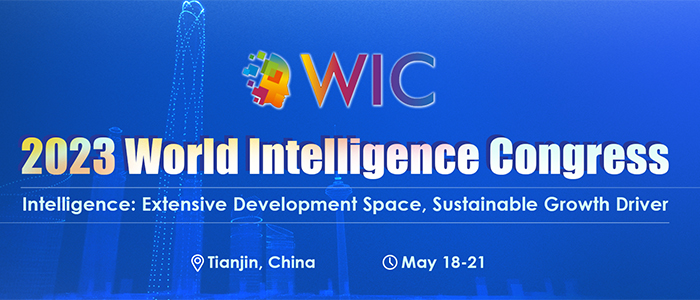
The Light of Internet Expo opens in Wuzhen, East China's Zhejiang province on Tuesday. As a part of the 2023 World Internet Conference Wuzhen Summit, the expo brings innovative companies from both China and around the world.
These exhibitors showcase the latest technologies and new products in various areas such as digital technology, intelligent manufacturing, digital education and cyberspace governance.
Click the video to learn more.
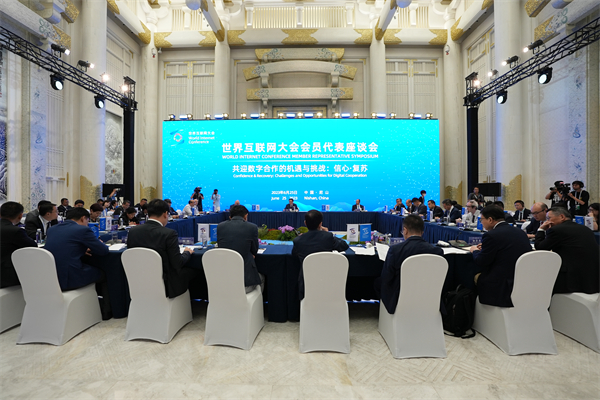
A symposium for the World Internet Conference (WIC) member representatives was held during the World Internet Conference Nishan Dialogue on Digital Civilization in Nishan, Qufu, East China's Shandong province, on June 25.
The symposium has as its theme "Embracing the Opportunities and Challenges of Digital Cooperation: Confidence and Recovery".
The Nishan Dialogue is the first thematic event held by the WIC as an international organization, said Ren Xianliang, secretary-general of the WIC.
He said the event is also an important symbol of the continuous expansion of the WIC business.
Ren stressed the principles of jointly building a community with a shared future in cyberspace, and deepening exchanges and cooperation, in a bid to provide new momentum for the social and economic development of the world.
He added that people should build consensus on governance to make the internet development more sustainable; boost digital economy to promote the building of an open world economy; deepen scientific and technological exchanges to facilitate the sharing of internet innovations worldwide; and insist on communication and mutual learning to inject impetus into civilization progress.
Around 40 member representatives of international organizations, world-leading internet companies and industrial institutions, attended the symposium.
12 member representatives, namely John Hoffman, CEO of the Global System for Mobile Communications Association Ltd; Mohamed Ben Amor, director general of the Arab Information and Communication Technologies Organization; Robin Li, founder and CEO of Baidu Inc; Daniel Zhang, chairman and CEO of Alibaba Group as well as president and CEO of Alibaba Cloud Intelligence; Zhang Zhiyong, executive director and chairman of the board of the China Tower; Zhou Hongyi, founder of the 360 Security Group; Zhao Jiazhen, co-chief executive of Shanghai Xunmeng Information Technology Co, Ltd; Cheng Wei, chairman of the board and CEO of DiDi Global Inc; Chen Xudong, chairman and general manager of IBM Greater China Group; Hou Shengli, vice-president of Cisco Greater China; Qian Kun, global senior vice- president of Qualcomm; and Jiang Tao, vice-president of Intel Corporation, held in-depth exchanges.
They said that through digital cooperation and technological innovation, as well as technology empowering industries, numerous opportunities could be created for business departments of different countries.
The representatives urged actions to bridge the digital divide, establish and improve an international digital cooperation mechanism, and enhance regulations on moral principles, so as to promote digital cooperation.
They also called on all parties to work together to realize sustainable development goals.
In a world driven by innovation, robots have become an integral part of our lives. At the 7th World Intelligence Congress, smart robots take center stage, showcasing their remarkable capabilities and potential.
With their advanced technologies, such as supercomputing, AI algorithms and big data analysis, robots are now capable of extraordinary tasks, from brewing coffee and playing soccer to conducting industrial inspections and storing components.
These cutting-edge machines are revolutionizing various industries and sectors, from healthcare and entertainment to transportation and business services.
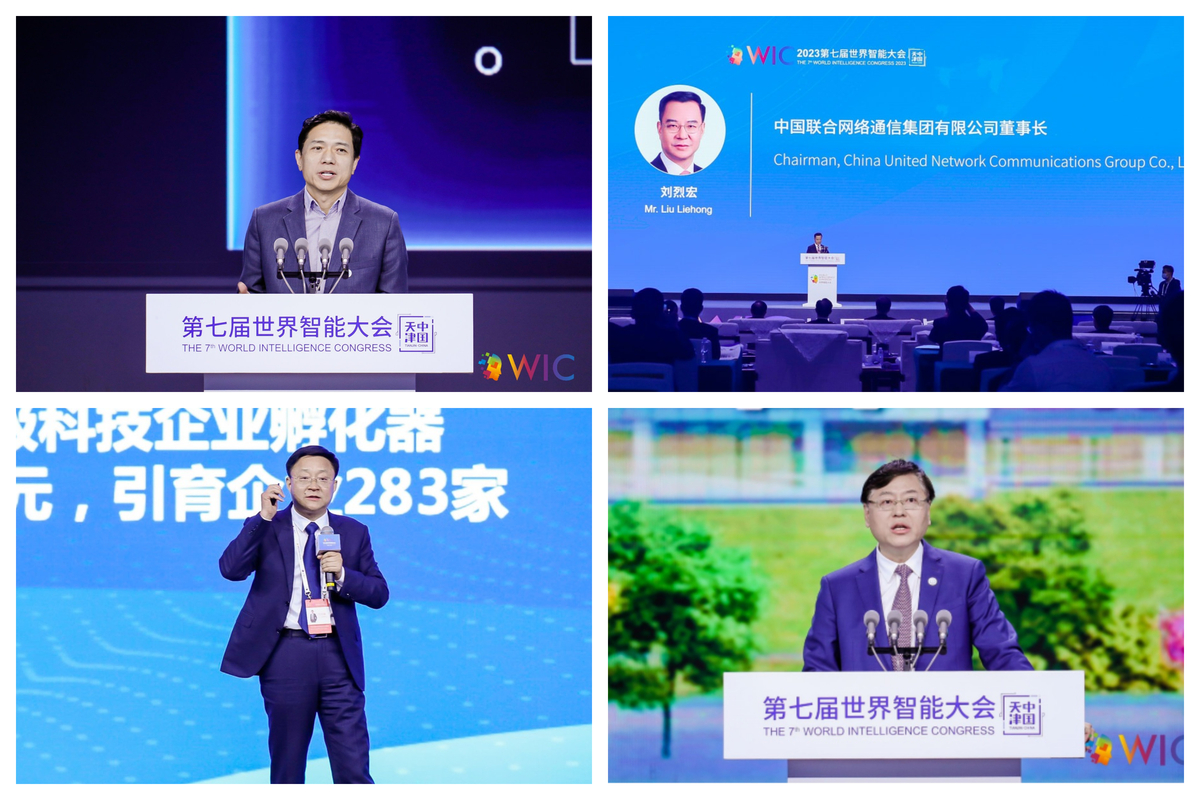
Business leaders, experts and government officials engage in an in-depth discussion on generative AI, large language models and the integration of 5G with the industrial internet at the summit on Innovation and Development of the 7th World Intelligence Congress.
The event, which opened in Tianjin on May 18, also showcases intelligent technology exhibition spanning 120,000 square meters with 10 themed exhibition areas.
China has secured the top position globally in terms of AI patent applications and holds leading advantages in computer vision, natural language processing, and speech recognition as of 2022, said Wang Zhigang, minister of science and technology, at the opening ceremony.
The core AI industry in China has exceeded 500 billion yuan ($71.46 billion) in scale, with over 42 million representative enterprises, accounting for about 16 percent of the global market, he added.
Business leaders from technology companies, including Baidu, Lenovo, iFlytek and 360 Security Group, delivered speeches in the AI field. Let's have a look on what they said at the summit.
Baidu CEO: AI's large-scale models create new jobs, drive progress
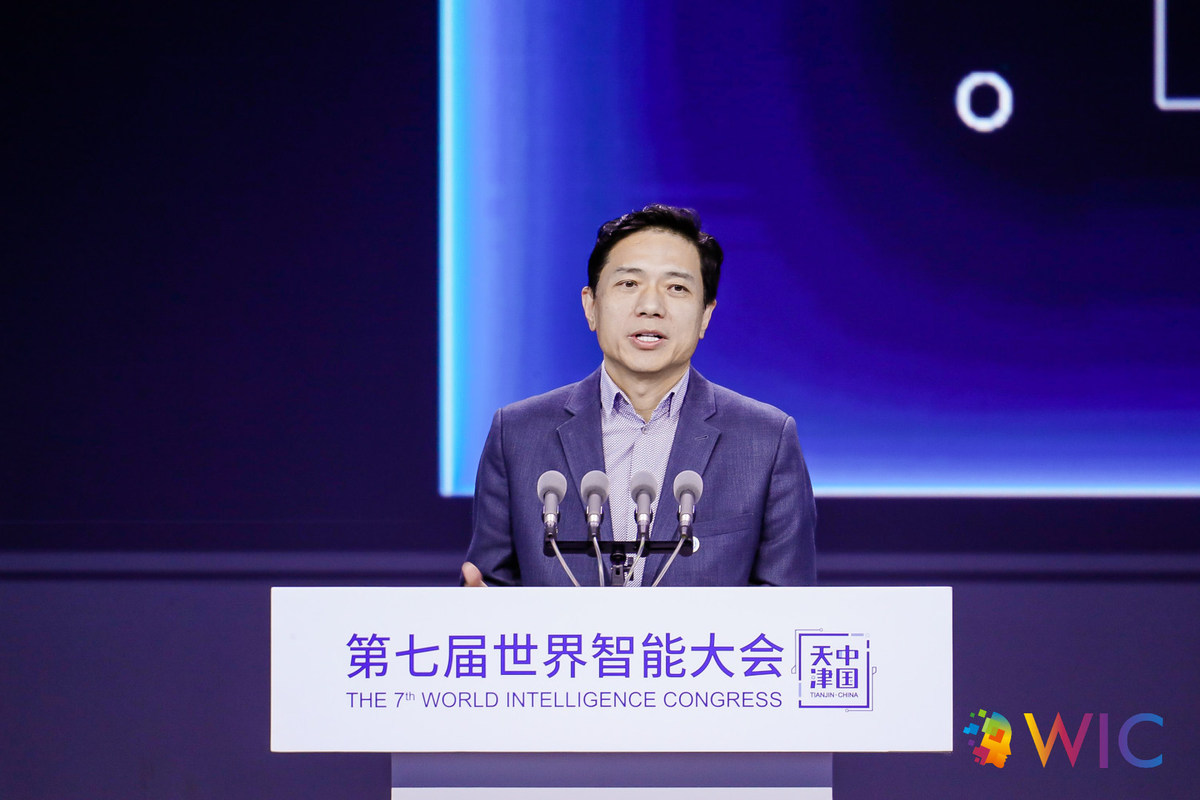
Robin Li, co-founder, chairman and CEO of Baidu Inc, said that the large-scale models will not reduce employment opportunities but create more new jobs.
The greatest danger for humanity is not in the uncertainty brought about by innovation, but rather in the risks associated with stagnation, lack of invention and absence of progress, he added.
Li explained the emergence of large-scale models in AI is attributed to increased computing power, large models and big data.
AI has gained more attention in the past six months due to the emergence of generative AI, powered by large-scale models. This has led to the emergence of intelligence, where machines can acquire skills without the need for pre-programming or explicit guidance.
He also highlighted a shift from discriminative AI to generative AI. The applications of the former one include facial recognition and search engines. While, the generative AI, which can be applied in multiple scenarios such as writing an application letter or creating a menu for a dinner party, has significantly increased human work efficiency in areas such as content creation, customer service and translation.
Lenovo CEO: Integration of digital and real economy empowers manufacturing innovation
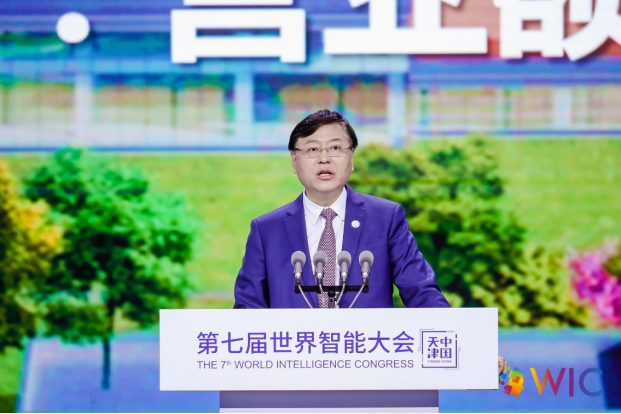
Yang Yuanqing, chairman and CEO of Lenovo Group, shared his insights on the integration of digital and real economy at the conference.
He said the manufacturing industry should elevate innovation to a strategic level by increasing investment in research and development and enhance their capabilities in technological innovation.
With breakthroughs in key technologies, enterprises can develop new products and models and gain a unique competitive advantage, enabling them to take the initiative in their development.
He emphasized that efforts should be placed on the construction of new infrastructure to provide the necessary computational support for improving productivity.
Recent developments such as the popularity of large language models like ChatGPT have demonstrated the value of AI for the real economy, which deserves attention and further research.
iFlytek chairman: SparkDesk is set to surpass the current version of ChatGPT in Chinese in October
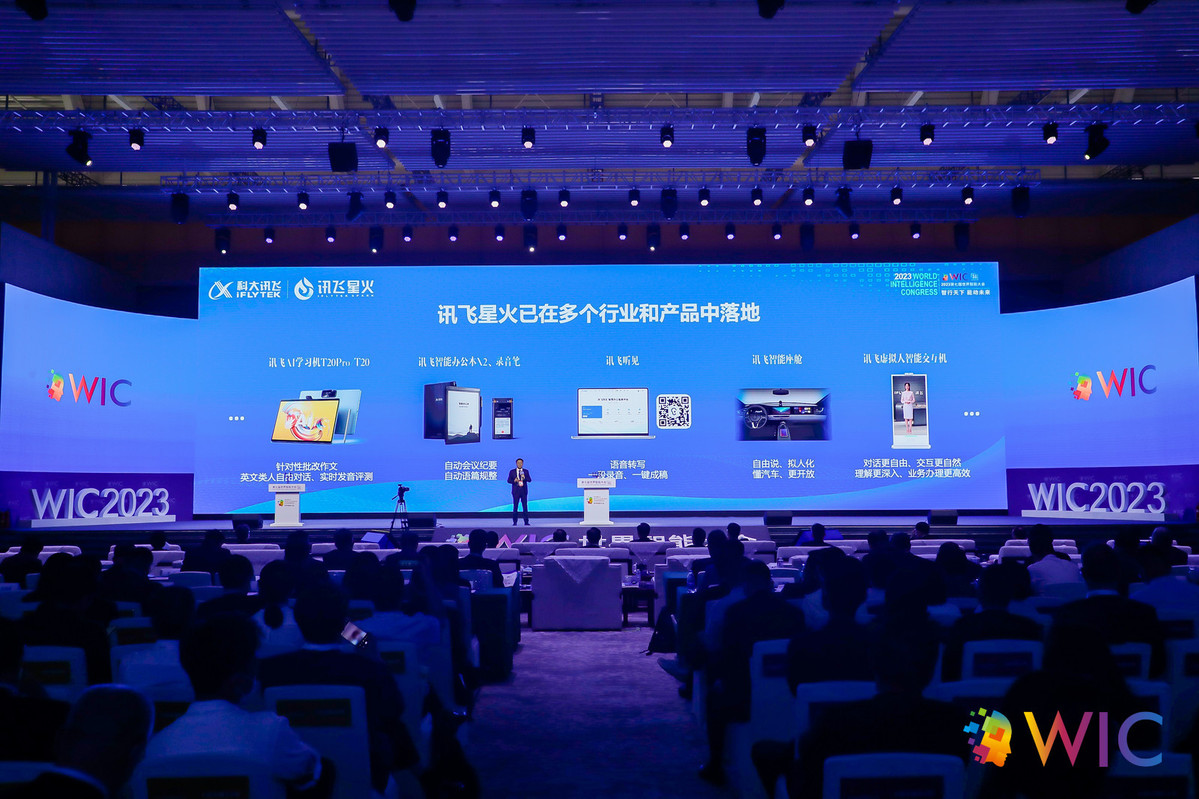
China needs to seize the opportunities in the AI industry through two key elements: developing independent and controllable platforms and learning from global advanced intelligence technologies, said Liu Qingfeng, chairman of iFlytek.
Liu said that cognitive large-scale models have emerged as a breakthrough in achieving generative AI. However, he acknowledged that pure large-scale models still have some limitations, such as the challenge of timely knowledge updates and the potential for misinterpretation in factual question-answering.
He highlighted the progress of iFlytek's SparkDesk, an AI-based large language model released on May 6. SparkDesk has surpassed ChatGPT in three key capabilities: text generation, knowledge questioning and mathematical abilities, he added.
It is expected that SparkDesk will achieve a universal model that matches ChatGPT in October, surpassing the current version in Chinese and leading the education and healthcare industries.
360 Security Group founder: Large-scale models powering the peak of digitization
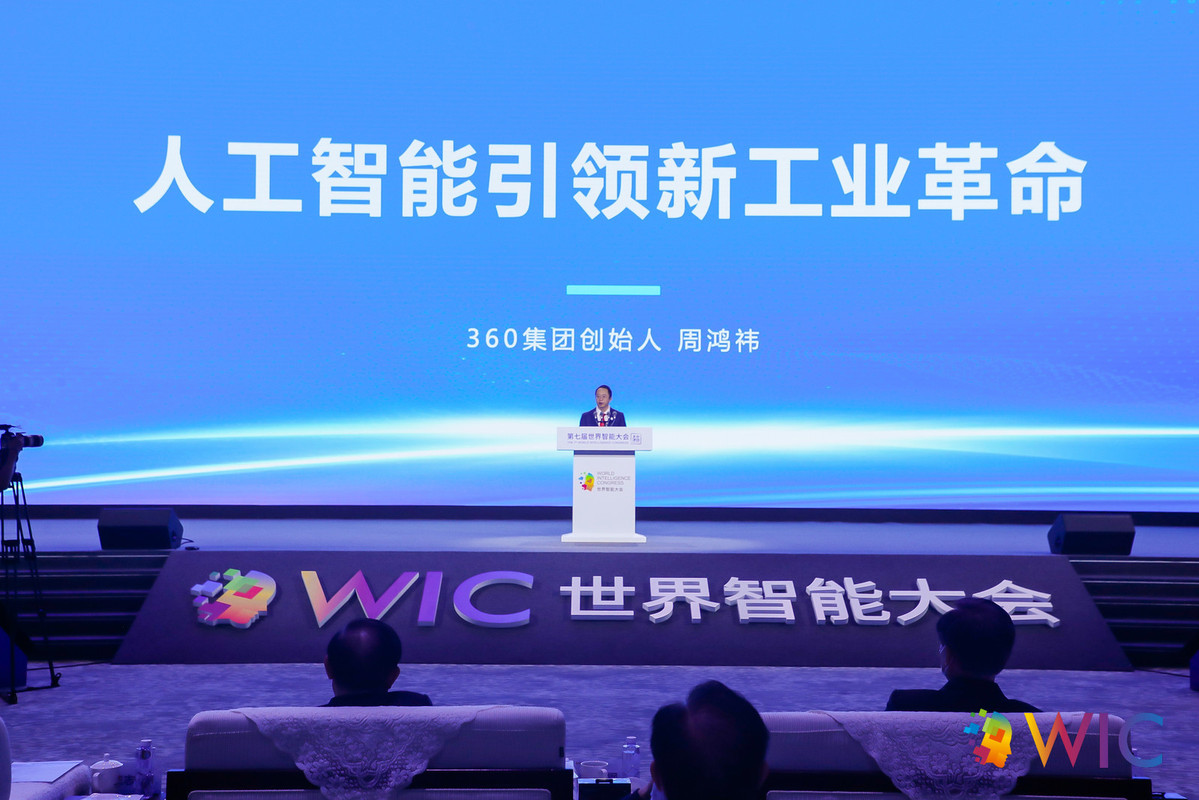
Zhou Hongyi, founder of cyber security company 360 Security Group, said the peak of digitization will be reached through the intelligence powered by large-scale models.
He regards GPT as a superior generative AI that re-encodes and stores all knowledge, marking the era of super AI with profound social impact.
The large-scale models will bring about a new industrial revolution by processing vast amounts of previously unusable big data into actionable insights, empowering various industries.
Each city and government department in China will have its own large-scale model in the future, acting as powerful assistants and transforming government operations.
He also emphasized the importance of China catching up in large-scale model development for productivity, expressing confidence in the country's ability while advising a long-term approach to overcome challenges.
China Unicom chairman: Telecom operators lead the way in Chinese cloud computing
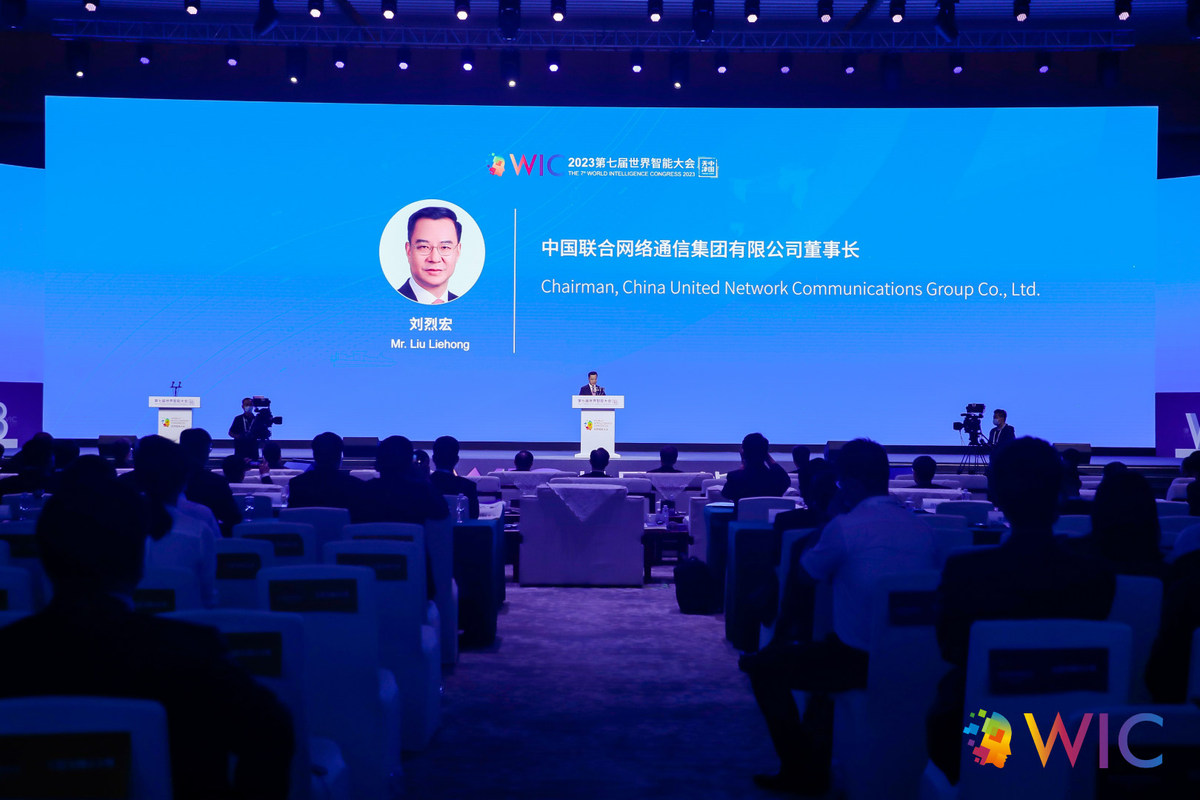
China Unicom chairman Liu Liehong said that telecom operators are at the forefront of Chinese cloud computing enterprises at the conference.
Liu highlighted the three distinct transformations of Chinese telecom operators, namely the data-driven boom from 3G to 5G, the accelerated growth of data centers and cloud services in the 4G era, and the current embrace of digital transformation driven by AI and the demand for computing power.
He emphasized the immense computational requirements of models like ChatGPT, with training necessitating substantial investment and the integration of cloud computing being the optimal solution to meet AI's computational needs.
The deep integration of AI and cloud computing act as a key driver for digital and intelligent transformation. Intelligence, as a fundamental technology of the digital era, is becoming a vital factor in reshaping global resource and restructuring the global economic structure.
China Unicom will make commitment to innovation and the development of secure, integrated and customized cloud solutions that serve as both enabling platforms for customers' digital transformation and powerful computing engines for industry-specific digitalization efforts, he said.
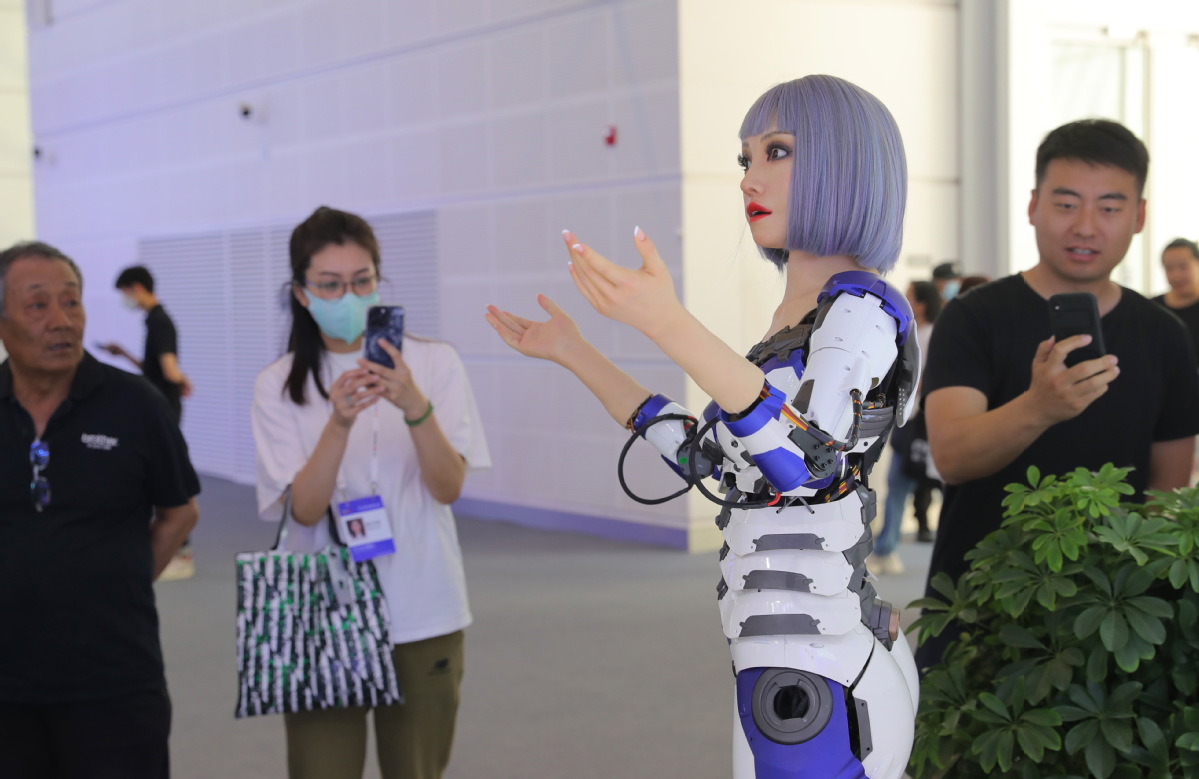
China will intensify efforts to develop artificial intelligence, both in theoretical research and cutting-edge technologies, to build a batch of regional AI industrial hubs for economic and social development, officials said on Thursday.
"China considers AI an important means of enhancing productivity, upgrading industries and improving people's well-being. The country has launched AI development plans and supported the establishment of 18 national new-generation AI innovation and development pilot areas and 32 innovation platforms across the country," said Wang Zhigang, minister of science and technology.
The nation has also actively addressed risks and challenges — such as the ethical governance of AI — that the new technology could bring about, Wang said at the opening ceremony of the World Intelligence Congress in Tianjin.
Wang also called for deeper cooperation among global scientists, entrepreneurs and engineers in AI technological innovation, application, and ethical governance, to promote the sustainable development of AI worldwide.
According to the Ministry of Science and Technology, the rapid development of AI in China has produced significant results. As of 2022, China had the world's largest number of AI patent applications, the highest number of published academic papers and citations. The country is among leaders in the field of computer vision, natural language processing, and speech recognition globally. The size of core sectors in the AI industry exceeded 500 billion yuan ($71 billion), with more than 4,200 representative companies accounting for approximately 16 percent of the world's total.
Minister of Education Huai Jinpeng said efforts have been stepped up to actively promote the integration of AI in education by establishing a national smart education public service platform that includes more than 7,100 lessons on job training and about 27,000 lessons on higher education. As of date, the platform had over 25.1 billion views from more than 200 countries and regions.
Chen Min'er, Party secretary of Tianjin Municipality, said more efforts will be made to promote AI use in city governance to facilitate the construction of smart cities.
"We will promote the high-quality development of AI, strengthen the research and development of core technologies such as brain-inspired intelligence and brain-computer interface, promote the deep integration of AI with industries, and facilitate the transformation and upgrade of traditional industries, foster new industries and vigorously develop new energy and intelligent connected vehicles," Chen said.
Tianjin will also use AI to facilitate high-quality reform and opening-up, and utilize new-generation information technologies, such as big data and AI, to promote reforms in finance, taxation and technology sectors to create a first-class business environment that is market-oriented, legalized and internationalized, Chen added.
During the opening ceremony, Zhou Hongyi, the founder of cyber-security company 360 Security Group, demonstrated how technology can be harnessed to improve city management by launching two new AI products that are able to answer questions relevant to Tianjin's economic and social development and form a picture of future district layout.
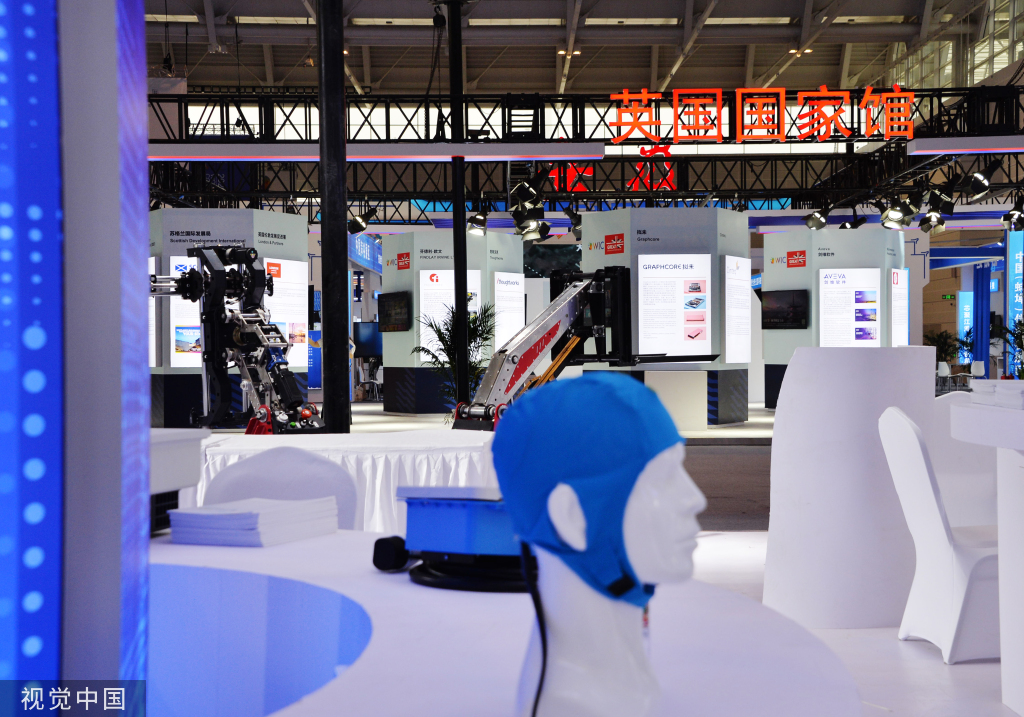
TIANJIN - The seventh World Intelligence Congress (WIC), a major artificial intelligence (AI) event in China, kicked off in the northern Tianjin Municipality on Thursday.
With an aim to build a global platform for academic exchanges, exhibitions, innovation and business promotion in the field of intelligent technology, this year's event has attracted almost 500 exhibitors from all over the world.
"In recent years, China has experienced rapid growth in the AI industry, resulting in notable economic and social benefits," said Wang Zhigang, China's minister of science and technology, speaking at the opening ceremony of the event.
By 2022, China had secured the top position globally in terms of the number of patent applications filed for AI technologies. The scale of the core AI industry in China has surpassed 500 billion yuan ($71.46 billion), with more than 4,200 major enterprises, comprising approximately 16 percent of the global total, the minister noted.
The four-day event, themed "Intelligence: Extensive Development Space, Sustainable Growth Driver," is being held at National Convention and Exhibition Center (Tianjin) and multiple other venues in the port city.
Covering a record exhibition area of 120,000 square meters, the intelligent technology event has set up 10 themed exhibition areas, including information technology application innovation, AI and 5G+ industrial internet.
Since its inauguration in 2017, the event has offered a platform for scientists, entrepreneurs and economists from home and abroad to discuss the frontier trends of intelligent technology.
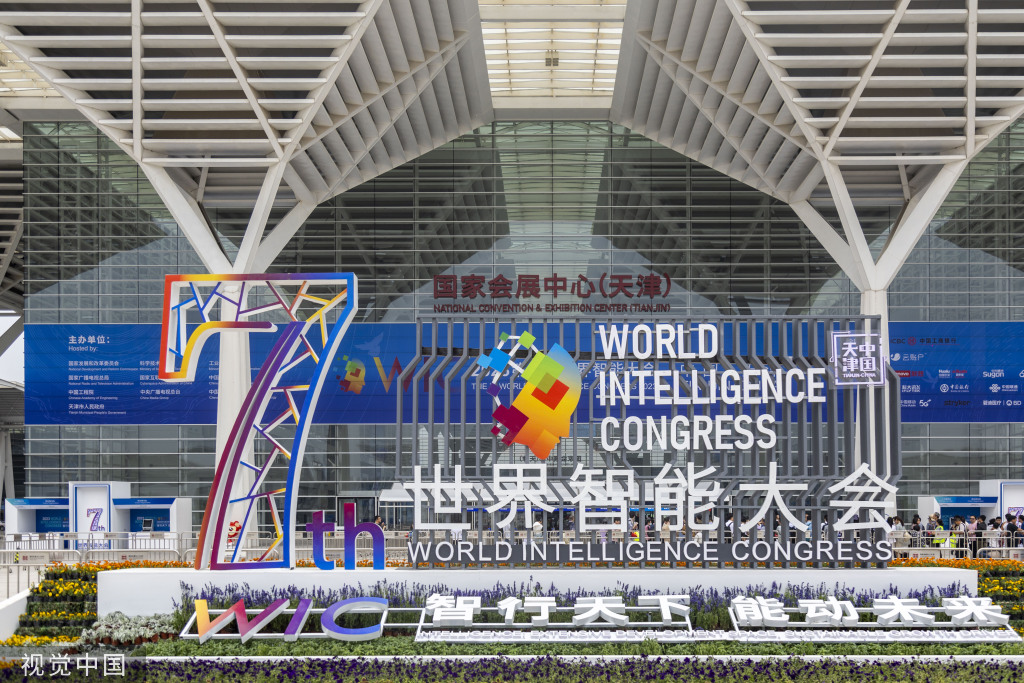
The 7th World Intelligence Congress kicked off in Tianjin on Thursday with a theme of "Intelligence: Extensive Development Space, Sustainable Growth Driver."
The 4-day event focuses on empowering economic and social development with smart technologies and building a global platform for exchange, cooperation, win-win outcomes and sharing in the field of intelligent technology.
Covering an exhibition area of 120,000 square meters, the intelligent technology exhibition set up 10 themed exhibition areas, including information technology application innovation, AI and 5G+ industrial Internet, and two smart experience areas focusing on the likes of 5G and smart cars.
In addition, the exhibition also covers products, initiatives and technologies such as scientific research and application, smart city and transportation, international and regional collaboration, and intelligent manufacturing.
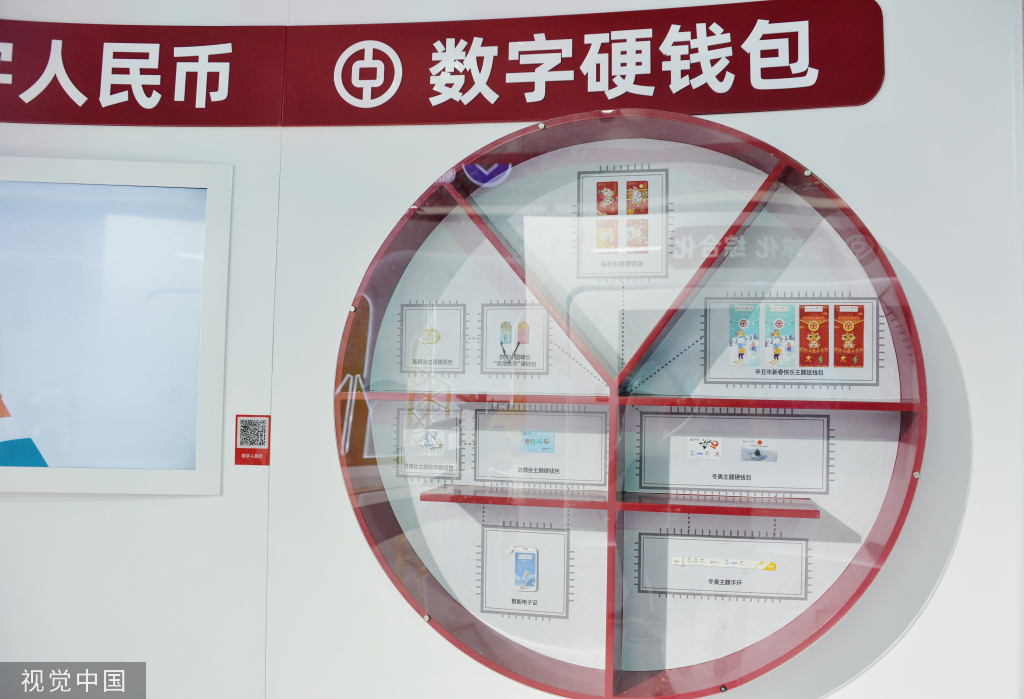
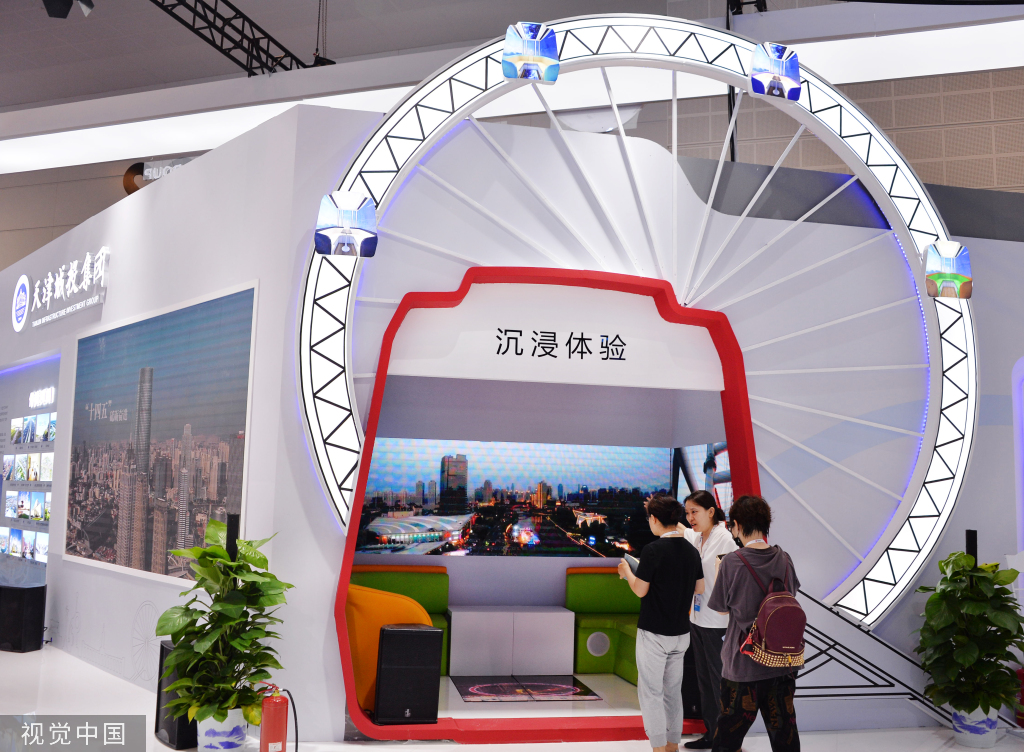
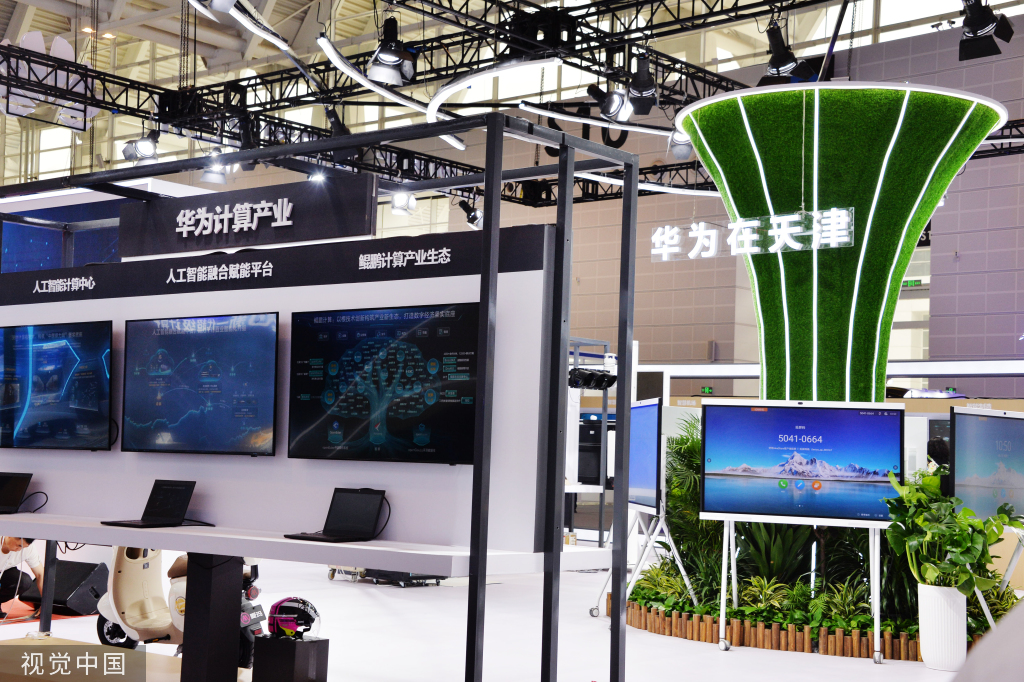
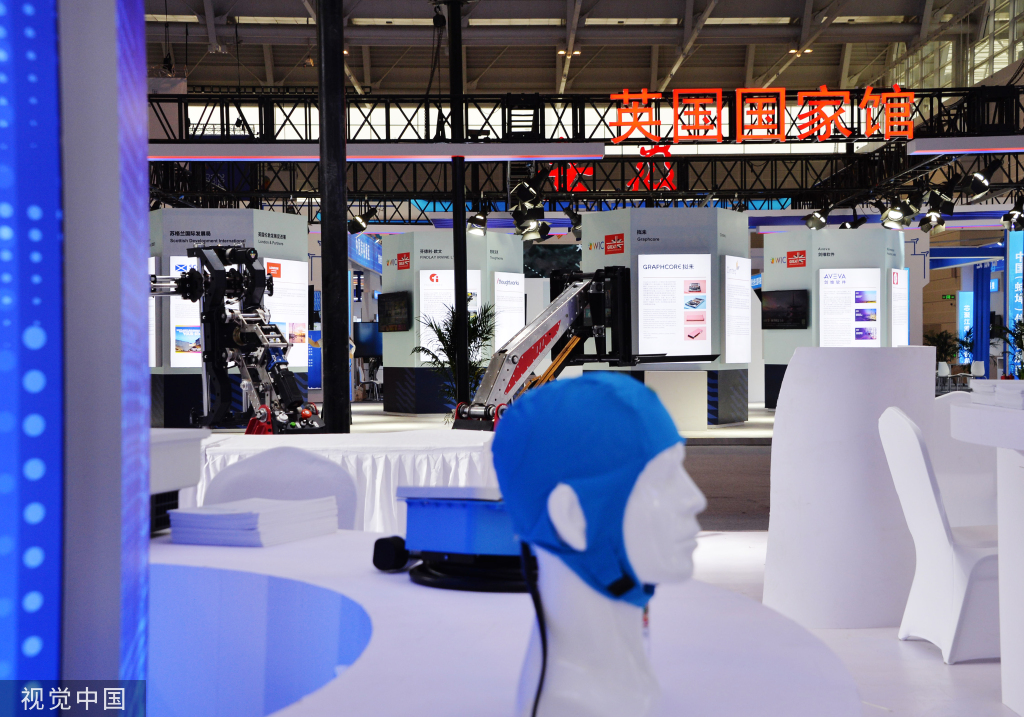
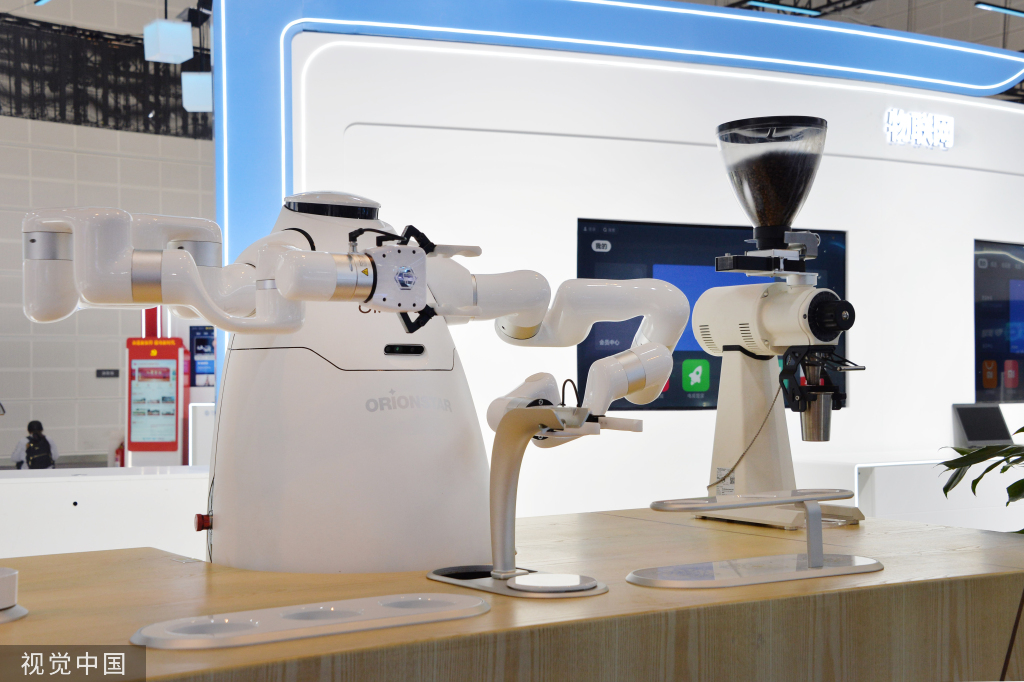
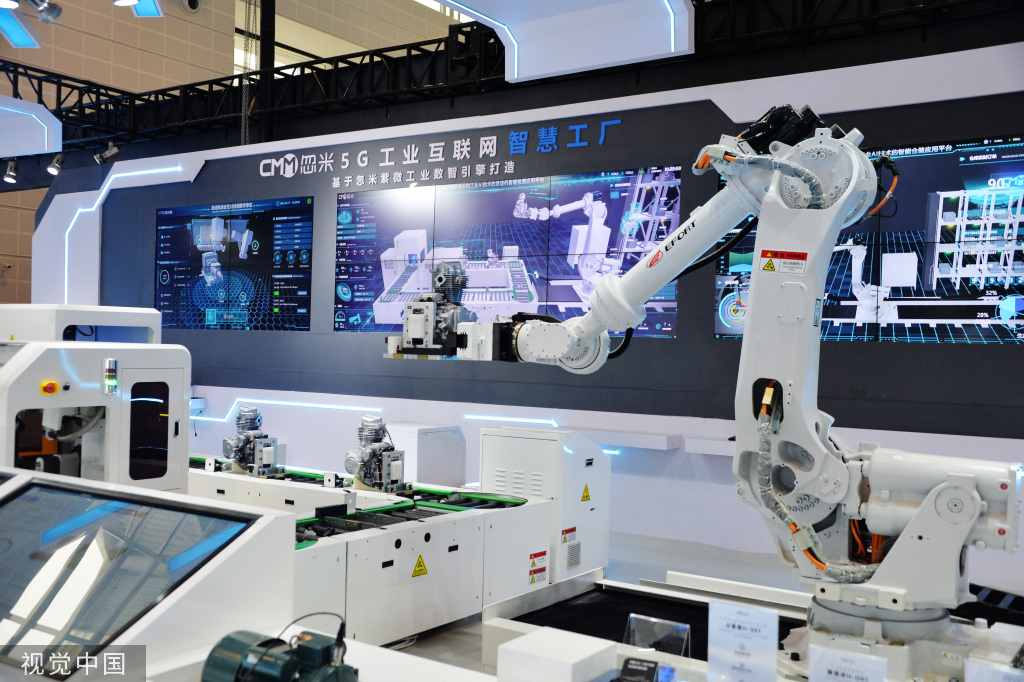
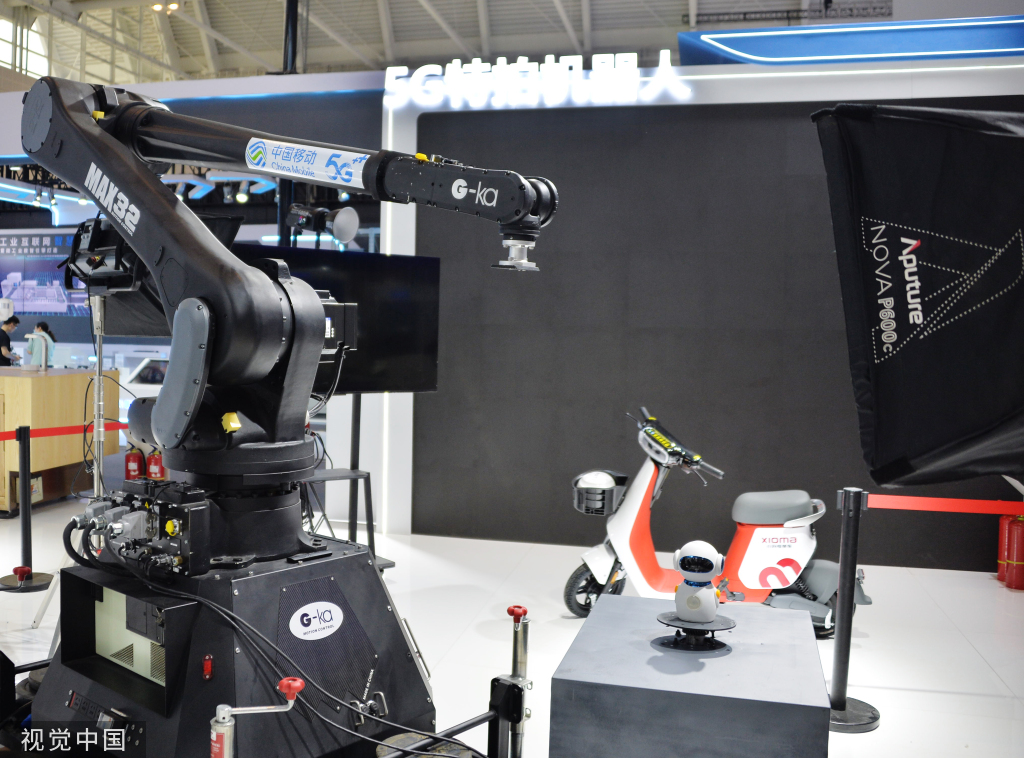
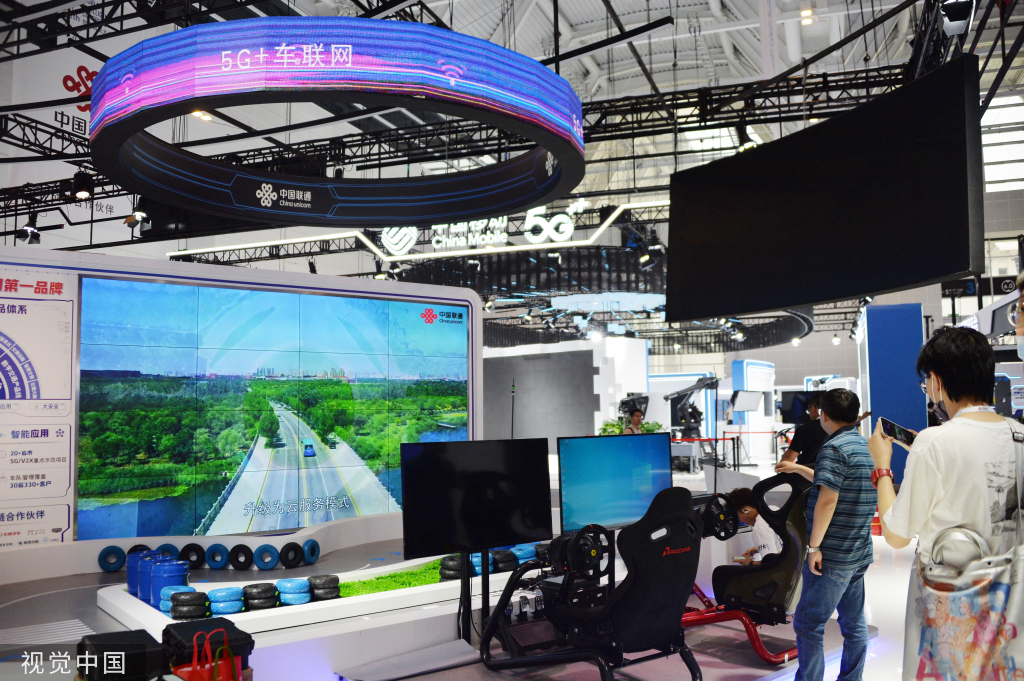
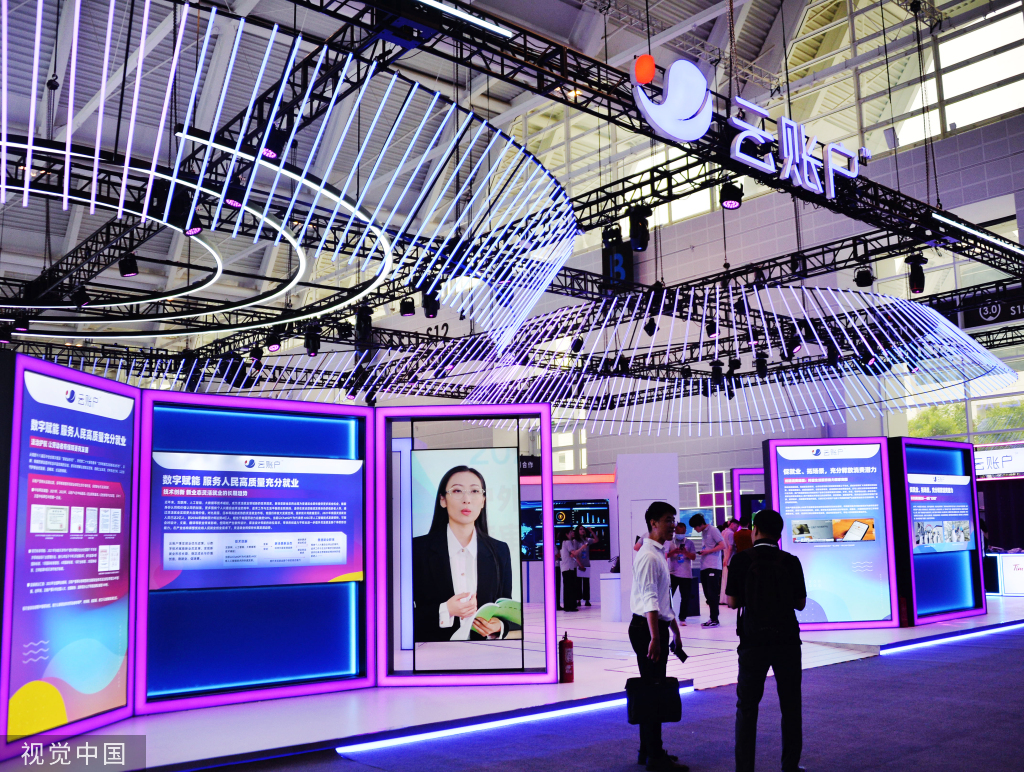

Technological advances transform computer industry and daily life
Just five seconds after Abu was asked to paint a picture of cattle returning to a farm, an image was provided with the reply, "Here it is".
The work of art was truly impressive, as Abu is not a human, but a robot based on artificial intelligence, or AI.
In addition to painting, the robot can write reports, make video clips, and, at the command of those in its user group, perform all the tasks a human can do on a computer.
Thanks to the development of computer algorithms, the development of AI has accelerated so rapidly in recent years that it has acquired skills previously thought to be the sole preserve of humans.
Zhou Xiao, an assistant professor at Renmin University of China's Gaoling School of Artificial Intelligence, listed some examples of AI that can be used in daily life, including those that compete with humans in playing games such as Go.
This game, developed by the AI company DeepMind in October 2015, features a search algorithm, deep neural networks and reinforcement learning — the science of decision-making.
AI can also recognize car registration plate numbers to help police hunt suspects. For example, in 2016, AI could correctly recognize 94 percent of car plate numbers, but a police officer was still required to man a computer screen. By 2020, AI could correctly recognize 99 percent of car plate numbers, doing away with the need for a human. Police forces are also benefiting from the use of robotic dogs.
The recently launched AI-related technology ChatGPT (Generative Pretrained Transformer) uses a natural language transformer algorithm to enable it to "understand "human language.
Wang Jianshuo, founder and CEO of Baixing AI, a company building the basic infrastructure for a world in which bots talk with bots, said, "The way in which this algorithm works is comparable to finding a point in a space.
"In human language, one might need thousands of parameters to describe an object. For example, to be defined, an apple needs parameters such as "edible", "fruit", "green "or "red", and to be grown from a tree. It is generally less than 10 centimeters in diameter. The more parameters there are to define, the more accurately AI can find the right point."
Wang cited apples and bananas as two examples. With parameters such "edible", "sweet" and "fruit", neither humans nor AI could distinguish them from each other.
But with the addition of parameters referring to shape, such as "long" or "round", such distinction is achieved. Parameters referring to color, such as "red", "green" or "yellow" enable a more certain judgment to be made.
"That's also how GPT works — most of the time it takes thousands of parameters for AI to define an object like we humans do. We just do not realize that," Wang said.
GPT-3 technology, on which ChatGPT and related technologies are based, features an excellent understanding of human language.
Unlike other forms of AI that can only take commands from certain types of sentences, GPT-3 analyzes a sentence like humans do to obtain its true meaning, which enables it to be commanded like talking to a friend.
However, this also means that AI might be misunderstood if given orders without ample clarity and information.
A reporter twice asked BaixingAI, a domestic app, to draw an image titled "crane". However, the app initially drew a bird flying amid mountains and rivers, before drawing a machine working at a construction site.
In an academic essay on ChatGPT's potential, prospects and limitations, Zhang Junping, a professor of computer technology at Fudan University in Shanghai, stressed that the amount of data the language model uses is of key importance to AI such as GPT.
"ChatGPT generates responses that match the user's intent with multiple variations. It captures previous conversational context to answer certain hypothetical questions, greatly enhancing the user experience in conversational interaction mode," Zhang wrote in the essay.
Swift progress
AI has revolutionized not only the computer industry but also daily life. With the technology making major progress in the games industry over the past five years, people can now play games such as chess or Go with smart forms of AI as opponents to sharpen their own skills.
With image-recognition AI becoming more advanced, it is now easy to use it to unlock a door or make a payment. GPT is also developing rapidly, with the result that the way in which people interact with computers might change.
Chen Jing, a researcher at the Fengyun Institute of Science, Technology and Strategy in Beijing, said the progress made by GPT, and the emergence of GPT4, have fundamentally changed the way in which humans interact with computers.
Computers typically receive instructions from humans mainly through a keyboard or mouse, with the user clicking on an icon, or typing in a command. However, with speech recognition and facial recognition AI technologies becoming more mature in the 2010s, computers can now receive new forms of input, such as sound, Chen said.
GPT4 technology, announced by the research company OpenAI on March 15, takes this process a step further. With its ability to recognize images more accurately and reliably, this technology understands humans more efficiently.
Chen said the technology could enable humans to command machines through gestures. For example, there are already smart appliances on the market that can be given oral instructions. In the future, humans will be able to convey such instructions simply by waving their arms, with this action being caught on camera. Such technology currently exists but is not yet fully developed.
"Imagine leaving home for the office. You have to turn off the lights and lock the door," Chen said. "With GPT-4, all you need do is wave goodbye to the camera at your gate, and AI will understand you, turn off all unnecessary appliances, close the door, and lock it.
"When you come home, just smile at the camera, and it will 'wake up' everything. This is not only because AI recognizes your face based on technology that became fully developed around 2020, but also because it can understand your gestures based on GPT-4."
Wang said one of the biggest changes AI could bring to humans is the way in which we live.
"There used to be a saying that AI could only do repetitive work, such as copying and pasting, but as it has advanced, such a saying is fast becoming outdated. Today, AI is creative, as shown in the images it draws, and it also saves time and energy for we humans and helps us be more creative."
Occupational link
Not everybody is delighted with the advances made by AI, and such unhappiness appears to be linked to a person's occupation.
Xi Li, a 41-year-old painter, who uses a pseudonym, said: "The images drawn by AI are soulless. This technology can help humans, but never replace human hands.
"We don't call the work produced by AI a drawing — AI is only collecting material online and sticking it together."
A science fiction writer, who requested anonymity, said AI can never write as well as professional writers. "There is no yardstick to measure how good an essay is, but those written by AI just do not ring true," he said.
Qu Xiaobo, a professor at the Institute of Population and Labor Economics and deputy director of the Chinese Academy of Social Sciences' Human Resource Center, said some people are worried about losing their jobs to AI.
"This is understandable. Even we professors worry about being replaced by AI professors," he said.
Qu remains positive about employment prospects in the age of AI. "While diminishing jobs, AI also creates new ones," he said.
"Its general effect on the market will depend on how many jobs disappear and the number of new ones that emerge. Apparently, AI will increase Total Factor Productivity, or TFP, in society, which means it will theoretically create more jobs than it replaces."
A search for "AI" on several domestic job websites locates new positions involving AI such as "consultant," "engineer "and "tutor". In Beijing, these jobs cover numerous pages, with the salaries offered ranging from 15,000 to 30,000 yuan ($2,182 to $4,365). The average monthly salary for such jobs last year was about 15,000 yuan.
Qu said these newly emerging jobs mainly involve dealing with AI, or what he terms "jobs for human-AI interactions".
Wang said the rapid development of AI will create new jobs, adding that with every major technological advance, new employment opportunities emerge.
"With the invention of automobiles, we got drivers, with the invention of airplanes, we got pilots. Living standards in general have been rising with such progress, as productivity has increased. The faster AI progresses, the easier life will become," Wang said.
However, keeping hold of a job remains a challenge for many who lack the skills needed for a new occupation.
Qu said there is a "structural mismatch "in the jobs market, adding that this is not unique to AI, but has been observed throughout human history, as technology makes continual progress. The difficulties graduates currently face in finding jobs are part of such a "structural mismatch, Qu added.
To solve this problem, individuals need to keep learning new things to acquire experience and skills. Qu also stressed the role played by the State in providing employees with better training to enable them to constantly update their skills to meet changes in the employment market.
Zhang, from Fudan University, said AI is still far from being sufficiently developed to replace humans.
Addressing the future of AI, all the interviewees in this article see hope.
Zhou said GPT-4 has not performed well in all tests, but it has revolutionized the AI industry by enabling it to understand the human tongue.
"In essence, AI has been invented by humans to assist them," Zhou added.
Yang Xiaoheng contributed to this story.
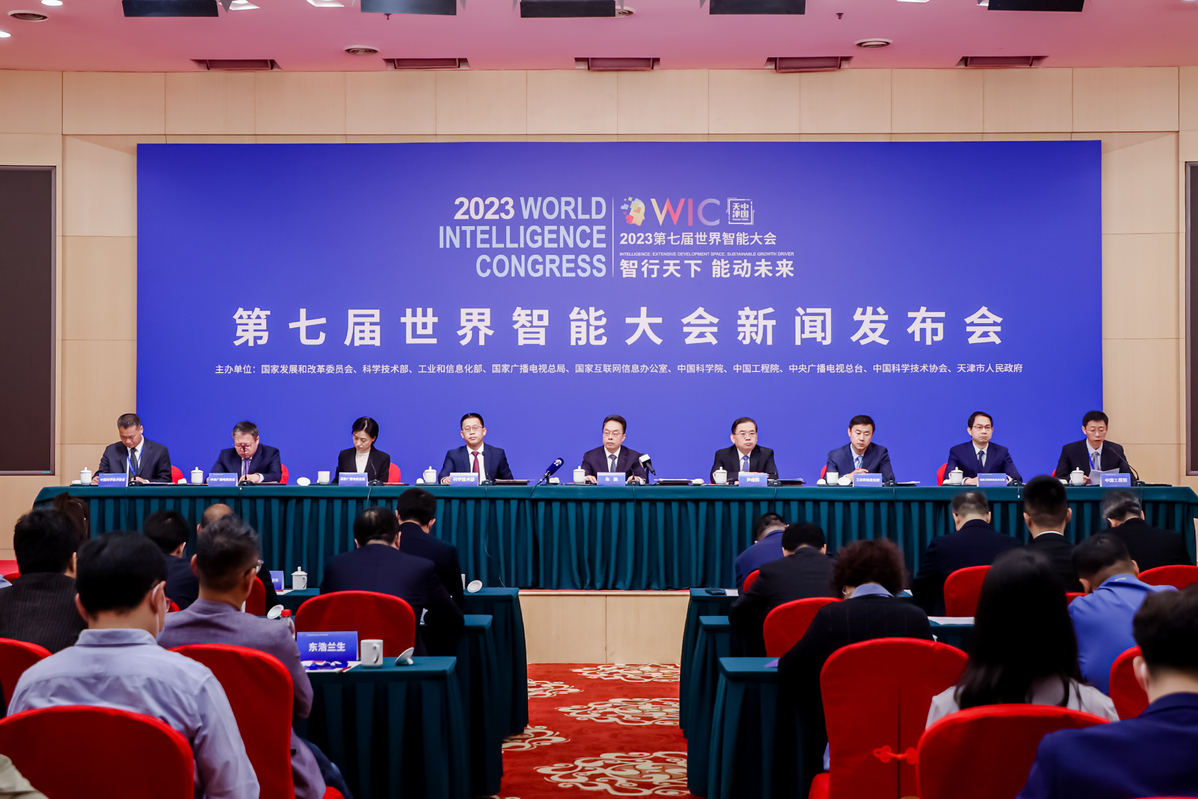
The 7th World Intelligence Congress is set to take place from May 18 to 21 in North China's Tianjin municipality, with the largest, high-quality smart tech exhibition to be held offline, said Zhu Peng, deputy mayor of Tianjin at the news conference for the event on Thursday.
This year's AI congress, under the theme of "Intelligence: Extensive Development Space and Sustainable Growth Driver", aims to showcase the latest achievements and trends of AI development and expand international cooperation into new fields.
The four-day event will bring together experts, scholars and entrepreneurs from 21 countries and regions to discuss topics such as intelligent connected vehicles, generative artificial intelligence, brain-machine interaction and other cutting-edge technologies.
This year's WIC will host two major summits, the Summit on Innovation and Development and the World Summit on Intelligent Technology Innovation and Cooperation, which will bring together experts and scholars to discuss global frontier topics of intelligent technology.
Parallel forums on various topics including intelligent connected vehicles, intelligent manufacturing, generative AI, Internet and medical health, and urban energy revolution will also be held during the event.
The 7th WIC will also hold its intelligent technology exhibition at the National Convention and Exhibition Center in Tianjin for the first time, covering an area of 120,000 square meters.
It includes 10 themed exhibition areas, such as information technology application innovation, AI, 5G and industrial Internet, intelligent transportation, intelligent manufacturing and smart life, as well as two intelligent experience areas for 5G and intelligent connected vehicles.
The smart tech exhibition will showcase cutting-edge products and technologies from 487 domestic and international enterprises, including world and domestic top 500 enterprises and research institutions and universities.
Multiple international organizations and institutions, such as the Society of Automotive Engineers from the United States and the Asia-Pacific Engineering Organization Federation, will participate in the conference, seeking new models and opportunities for industrial cooperation.
Over the past six years, WIC has helped sign 702 cooperation agreements with a total investment amount of 543.8 billion yuan ($78.35 billion), where delegates from 41 countries and organizations gathered in Tianjin to deepen international pragmatic cooperation.
Nearly 100 billion yuan of special funds for intelligent manufacturing have been allocated by the Tianjin's municipal and district governments, supporting nearly 3,000 projects and building over 300 intelligent factories and digital workshops.
The conference acts as a window for China to showcase the development of the AI industry, attracting online overseas visitors from over 30 countries and regions such as the United States, the United Kingdom, Germany, Australia, Japan, South Korea and Singapore.
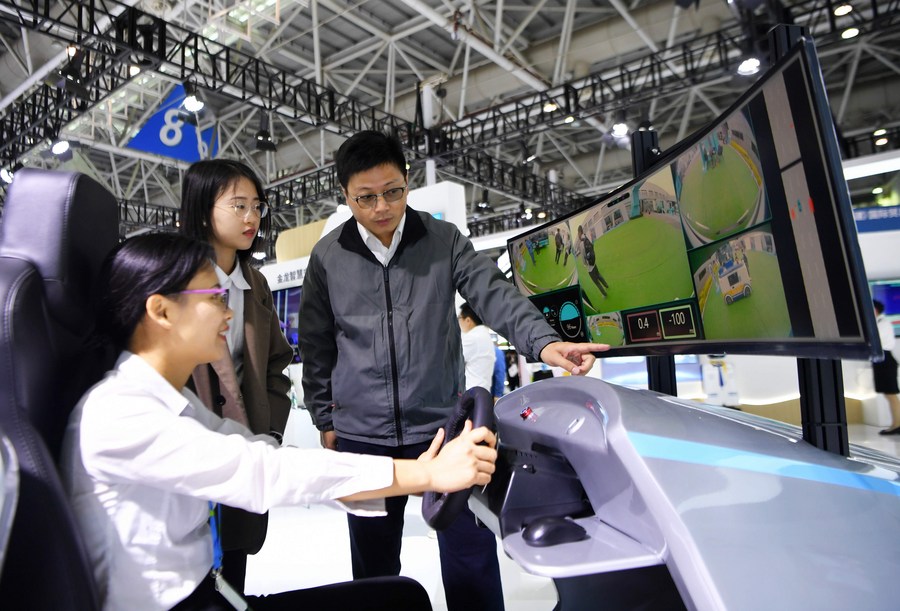
FUZHOU -- At the 6th Digital China Summit, an exhibitor surnamed Zhang experienced an AI emotion-recognition system. Simply standing in front of the device, her stress values, blood oxygen levels, heart rate and other physiological indexes appeared on-screen within seconds.
The AI emotion-recognition 3.0 system made its debut at the summit, a two-day event held on Thursday and Friday in the city of Fuzhou in east China's Fujian Province.
The AI system was developed by the smart information technology services provider Hengfeng Information. It uses a 4K high-definition camera to capture subtle changes in the brightness of human faces, and analyzes behaviors and physiological signals by building a computational model of emotional states.
"An emotional interaction between a human and the computer can be established based on the measured physiological states," said Lin Zhixian, a senior product manager at Hengfeng Information. "The device can be applied in many fields, such as public security, municipal governance, medical care, finance and insurance, and entertainment."
AI technology is accelerating its deep integration into various industries, constantly promoting the innovation and application of digital technology, which will beef up the integration and development of the digital economy and the real economy.
"AI has become a crucial driving force for China's leapfrog sci-tech development, its industrial transformation and upgrading, and the overall improvement of its productivity, propping up the replacement of old growth drivers with new ones and high-quality economic development," said Cao Shumin, deputy head of the Cyberspace Administration of China, when addressing a sub-forum at the summit.
During a digital product expo at the summit, humanoid robots welcomed a big crowd of visitors.
The Aelos EDU robot was developed by a leading humanoid robot company, Leju Robotics, and was designed to provide humanoid robot education services for primary and secondary school students and robot enthusiasts around the world.
"Students can customize our robots by programming. In the process, they can comprehend basic subjects like science, technology, engineering and mathematics better in a tangible and experiential environment," said Tian Guisheng, a senior product manager at Leju Robotics.
"We are committed to cultivating teenagers' AI interests, stimulating their innovative thinking through humanoid robot education, and providing a talent reserve for China's digital development," he said.
"In recent years, China has achieved fruitful results in AI development. The numbers of invention patents granted and papers published in the field of AI rank among the highest in the world," Cao said. Artificial general intelligence is expected to gain momentum. Making breakthroughs in the research and development of core technologies is crucial.
An artificial intelligence computing center established by the Fujian Electronics and Information Group was officially opened in Fujian on Wednesday.
Featuring a low-carbon mode, a high-density computing capacity and an integrated operating platform, the center is accelerating the construction of AI infrastructure and the deep integration of AI technology and relevant industries, which will boost the transformation and upgrading of various industries in Fujian.
The center intends to cooperate with 170 enterprises and scientific research institutions in the province. It has already cooperated with 47 high-tech enterprises to incubate AI innovation schemes based on local industrial characteristics, and trained more than 200 skilled individuals in related fields.
Though it promotes China's digital development, AI also brings about problems such as high energy consumption levels, high carbon emissions and environmental pollution. "Green AI is the inevitable trend for digital development in the future. It is necessary to set up a green technology innovation system and beef up efforts in the green AI industry," said Mei Jianping, deputy director-general of the Ministry of Science and Technology's Department of High and New Technology.

Chinese cloud computing companies are intensifying efforts to back the development of artificial intelligence or AI-powered large language models in the wake of ChatGPT fever unleashed by US-based AI research company OpenAI, experts said.
The process of developing AI models is systematic, requiring several technologies like computing networks, big data and AI frameworks, and needs immense computing power and large-scale intelligent computing infrastructure, they said.
Zhang Yong, chairman and CEO of Chinese tech heavyweight Alibaba Group and CEO of Alibaba Cloud Intelligence, said cloud computing serves as the best way to promote the application of AI on a large scale.
The group is committed to making computing and AI services more accessible and inclusive for enterprises and developers, he said.
Zhang also said he hopes the cost of training an AI model on Alibaba Cloud could be reduced to one-tenth or even one-hundredth of what it is now, with small and medium-sized enterprises having access to the capabilities and services of large AI models through the cloud platform.
Alibaba has recently unveiled its AI large language model, Tongyi Qianwen, joining the chatbot race and positioning itself as a potential rival to ChatGPT. The company will offer more enterprises access to Tongyi Qianwen on the cloud and help them build customized large language models.
Zhou Jingren, chief technology officer of Alibaba Cloud Intelligence, said: "Generative AI powered by large language models is ushering in an unprecedented new (high-tech) phase. We are witnessing a new paradigm of AI development where cloud and AI models play an essential role."
Cloud computing is playing an increasingly important role in Alibaba's overall business landscape. Revenue in its cloud business reached 20.18 billion yuan ($2.9 billion) during the October-December period, an increase of 3 percent year-on-year.
Baidu AI Cloud, the cloud computing unit of Baidu Inc, China's largest online search engine company, said the innovative integration of cloud computing with AI will lower the thresholds for enterprises to acquire and use AI technology. Baidu rolled out its large language model and ChatGPT-like product dubbed Ernie Bot last month.
The company estimated that the MaaS, or model as a service, which refers to a type of cloud-based service that offers access to machine-learning models to develop AI applications, will become the main business model for cloud computing companies.
The development of large language models requires massive computing resources, and cloud computing can play a vital role in supporting the training and application of ChatGPT-like AI tools, said Lu Guannan, an analyst from consultancy Forrester.
He said Chinese cloud computing platforms should pool more resources into building AI infrastructure, which covers a wide range of segments like integrated circuits, computer systems, data analysis and model training.
Cloud infrastructure services expenditure on the Chinese mainland grew 10 percent year-on-year to $30.3 billion last year, according to market consultancy Canalys. Alibaba Cloud led the cloud infrastructure services market, taking up 36 percent of total spending, followed by Huawei Cloud, Tencent Cloud and Baidu AI Cloud.
The scale of China's computing power industry has grown rapidly in recent years with an annual growth rate of nearly 30 percent, ranking second in the world, according to the Ministry of Industry and Information Technology. The revenue of core computing power industry reached 1.8 trillion yuan by the end of last year, amid the country's push to develop its digital economy, the ministry said.
Xiang Ligang, director-general of the Information Consumption Alliance, a telecom industry association, said cloud computing will become the key foundation of AI and help bolster the development of the digital economy.
"The establishment of next-generation digital infrastructure like intelligent computing centers and data centers will improve efficiency in the use of computing resources and accelerate enterprises' digitalization push," Xiang said.
Zou Debao, deputy general manager of the AI industry research institute at market research firm CCID Consulting, said with the increase of training intensity and computing complexity, the requirements of computational accuracy are gradually rising.

Tech heavyweights step up development efforts as concerns voiced over new problems
Artificial intelligence technology is expected to witness speedy growth in China and inject fresh momentum into a new round of industrial development, experts said.
This expansion comes as Chinese tech heavyweights step up efforts to develop their own AI-powered large language models amid a worldwide frenzy surrounding ChatGPT, they said.
Created in November by OpenAI, a startup based in the United States, ChatGPT is an acronym for Chat Generative Pre-trained Transformer. This intelligent chatbot is a computer program designed to stimulate conversation with human users, especially over the internet.
Large language models are AI models fed huge amounts of text data for use in a variety of tasks, ranging from natural language processing to machine translation. Chinese AI companies, experts said, should pool more resources into improving computing power, algorithms and quality of data, and increase investment in basic scientific research, including mathematics, statistics and computer science, to gain a competitive edge in the race to develop chatbots.
The experts added that the use of ChatGPT-style products and related AI technology have raised concerns about ethical problems, data security and leaks of personal privacy. As a result, it is highly important to draw up rules to regulate the use of such fast-developing technology and promote its healthy advancement.
Interest in generative AI, which refers to algorithms trained with huge amounts of data that are able to generate content such as images and text, has surged since the release of ChatGPT.
A host of Chinese tech giants, including Alibaba Group Holding and Baidu, have started to roll out ChatGPT-style products and services. Alibaba recently unveiled its AI-powered large language model Tongyi Qianwen, a potential rival to ChatGPT. The company plans to integrate Tongyi Qianwen into all its applicable businesses in the near future.
Zhang Yong, chairman and CEO of Alibaba Group and CEO of Alibaba Cloud Intelligence, said at the 2023 Alibaba Cloud Summit on April 11: "We are at a technological watershed moment driven by generative AI and cloud computing. Businesses across all sectors have started to embrace intelligent transformation to stay ahead of the game."
Large AI models will be used in a wide range of sectors, giving a significant boost to productivity and profoundly changing people's lifestyles. Alibaba Cloud, the cloud computing unit of Alibaba, will offer more enterprises access to Tongyi Qianwen so they can build their own customized large language models, Zhang added.
Alibaba began researching such models in 2019. It said its ChatGPT-like product will initially be deployed on DingTalk, the company's workplace messaging app, and it can be used to summarize meeting notes, create poetry, write emails and draft business proposals. It will also be added to Tmall Genie, Alibaba's voice assistant.
This announcement came one day after Chinese AI pioneer SenseTime launched SenseNova, its latest set of large AI models, which cover key capabilities including computer vision, natural language processing and AI-generated content.
Last month, Baidu introduced Ernie Bot, its large language model and ChatGPT-like product, which boasts capabilities in fields such as literary creation, business writing, mathematics, and understanding Chinese language. Ernie Bot could be used for a range of functions, including searches, autonomous driving and smart devices.
Robin Li, co-founder, chairman and CEO of Baidu, said Ernie Bot is not perfect, but the company is launching it now because demand is growing and the model will improve quickly as user feedback increases.
"We believe that AI will revolutionize every industry we know today. The immense long-term value of AI and its transformative impact on all aspects of life are only in their infancy," he said.
Li estimated that the multimodal large language model, which can generate text, images, audio and video based on given text prompts, is the future trend for generative AI.
New wave
Other Chinese tech companies have jumped onto the chatbot bandwagon amid a new AI wave triggered by ChatGPT.
Dowson Tong, senior vice-president of Tencent Holdings, said last month at the Boao Forum for Asia that the company is developing its ChatGPT-like chatbot.
He Xiaodong, vice-president of e-commerce giant JD, said recently the company would launch its new-generation large model dubbed ChatJD, a ChatGPT-like product for industrial use, later this year.
Pan Helin, co-director of the Digital Economy and Financial Innovation Research Center at Zhejiang University's International Business School, said, "Compared with its foreign counterparts, China has gained an upper hand in bolstering the industrial application of AI, as the country boasts relatively complete industrial categories, an ultra-large consumer market and a strong development foundation."
Noting that Chinese tech heavyweights and AI unicorns — startups worth more than $1 billion — have joined the rush to build large AI models, Pan is bullish about the prospects for the AI-generated content sector and the use of ChatGPT-style conversational chatbots in China.
Data from global market research company International Data Corp show that China's spending on AI will likely hit $14.75 billion this year, accounting for about one-tenth of the global market. The scale of China's AI market is expected to reach $26.44 billion in 2026, with a compound annual growth rate of more than 20 percent from 2021 to 2026.
China has made significant progress in developing AI technology. A Stanford University report shows that in 2021, the nation filed more than half the world's AI patent applications and continued to lead globally with the number of AI journals, conference papers and related publications.
However, Chinese AI enterprises still lag behind leading foreign competitors in core technologies and fundamental research and development in key fields such as chips and basic components, Pan said.
"The process of training large AI models necessitates higher requirements for computing capacity and algorithms, which rely on massive capital input," Pan added.
Lu Yanxia, research director at IDC China, said Chinese tech companies have the advantage of offering users AI-powered conversational results based on Chinese language and culture. "Generative AI has brought new business opportunities for domestic AI servers, cloud computing and chip companies," Lu added.
AI- and ChatGPT-related technologies are likely to free humans from tedious tasks and enable them to focus on creative thinking, resulting in significant application potential in fields such as culture, retail, finance, healthcare and education.
Chinese home appliance manufacturers and automakers have accelerated efforts to integrate AI chatbots into their products and services in the hope of providing a better human-machine interaction experience.
Home appliance giant Midea Group, based in Foshan, Guangdong province, is among the first batch of partners for Baidu's Ernie Bot. The company will bolster the upgrade of human-machine conversation abilities in the smart home sector by using cutting-edge generative AI technology.
Comparable uses are expected to add value to electric and assisted-driving cars. Smart electric vehicle company Jidu Auto, a joint venture established by Baidu and carmaker Geely Holding Group, said it will integrate Ernie Bot into its cars to develop the world's first large language model powered by AI interactive experience for smart vehicles.
Liu Fei, consumer electronics department research director at market consultancy All View Cloud, said: "The emergence of new AI technologies will better facilitate the conversational interaction between humans and smart home devices. The collaboration between household appliance makers and conversational chatbot developers will bolster the intelligent transformation of China's home appliance industry."
Concern voiced
Market consultancy Gartner predicts that by 2025, generative AI will account for 10 percent of all data created, compared with less than 1 percent last year, and it could be used for activities such as creating software code, facilitating drug development, and targeted marketing.
Meanwhile, commercial use of the revolutionary AI chatbot has triggered controversy and concern about how to regulate generative AI technology, given that a new set of problems is emerging, including ethics, academic cheating, and leaks that infringe on personal privacy and data security.
On April 11, China's cyberspace regulator unveiled draft measures for managing generative AI services. The Cyberspace Administration of China said providers will be responsible for the legitimacy of data used to train generative AI products, and measures should be taken to prevent discrimination when designing algorithms and training data.
The regulator said China supports the innovation and application of AI algorithms and other basic technologies, and encourages the use of safe and reliable software, tools and data resources. But content produced by generative AI should be in line with the nation's core socialist values and the laws on data security and personal information protection.
Companies should submit security assessments to the authorities before they launch their generative AI offerings to the public, it added. They should also ensure the accuracy of information, and not generate false information. The proposed measures are open for public comment until May 10.
Wu Shenkuo, a law professor at Beijing Normal University and deputy director of the Internet Society of China's Research Center, said, "In face of new technologies and applications, it is necessary to continuously explore a set of agile and efficient regulatory mechanisms to deal with related risks promptly."
Hong Yong, an associate research fellow at the Ministry of Commerce's e-commerce research department, said now is the right time to draft such rules, as more domestic companies have joined the rush to launch ChatGPT-like products and services, while problems concerning personal information and privacy protection are rising. The measures announced will help regulate the healthy development of the AI-generated content industry, Hong added.
The Payment and Clearing Association of China has called on companies in the payment industry to use ChatGPT with caution, in view of the risks of cross-border data leaks.
The association said in a statement that the risks of using ChatGPT and other tools to process work content should be comprehensively assessed, and such tools should be used in accordance with laws and regulations. It also said those in the payments industry should not upload key and sensitive information when using ChatGPT.
In an open letter late last month, Tesla CEO Elon Musk and a group of AI experts and industry executives called for a six-month pause in developing language models more powerful than OpenAI's newly launched GPT-4, citing potential risks to society.
Italy is the first Western nation to ban ChatGPT over its suspected breach of strict privacy regulations. Various governments worldwide are looking to come up with their own rules for AI.
Experts said generative AI technology is a double-edged sword, and it is necessary to make safe use of such technology to benefit humans.
Zhou Hongyi, founder of cybersecurity company 360 Security Group, said in a Sina Weibo post that not developing these models "poses the biggest insecurity", and China should continue to develop its own large language models.
The nation must keep up with the ChatGPT trend, as it will significantly improve productivity, thus enhancing the country's competitiveness, Zhou said.
"Whether people are willing or not, GPT will lead to a new round of industrial revolution that goes beyond the invention of the internet or the smartphone," Zhou added.
He said that as Chinese companies are still two years behind GPT-4's level of development, it is too early to worry about the risks associated with AI.
Shen Dou, executive vice-president of Baidu, said that with the emergence of generative AI, "Chinese companies should take action as soon as possible and rethink their advantages and ways to use AI to amplify these advantages".
He said generative AI will result in new occupations, and predicted that 50 percent of people will act as "instructors" in the future to guide AI in performing tasks. As a result, the disappearance of some jobs is bound to create new ones.
An Hui, deputy chief engineer at market research company CCID Consulting, said AI-related technologies are gaining momentum in China, and their use is accelerating in a wide range of sectors, including healthcare, transportation, finance, manufacturing and agriculture.
He added that more efforts should be made to step up the upgrading and use of cutting-edge technologies, such as intelligent chips, deep-learning frameworks, key algorithms, and natural language processes, as well as accelerate the integration of AI with 5G, big data, cloud computing and blockchain technologies.
Lu Guannan, an analyst at research company Forrester, said competition in the AI chatbot sector is heating up and the companies who initially launched AI large language models will have some advantages in obtaining users and exploring application scenarios.
More efforts should be made to enhance natural language processing capacities and reliability of generated content, Lu added.
Guo Tao, deputy head of the China Electronic Commerce Expert Service Center, said, "The use of ChatGPT and AI-related technology is still at a nascent stage, and there is a long way to go to realize its large-scale commercialization, as the application scenarios and related laws and regulations are far from mature."
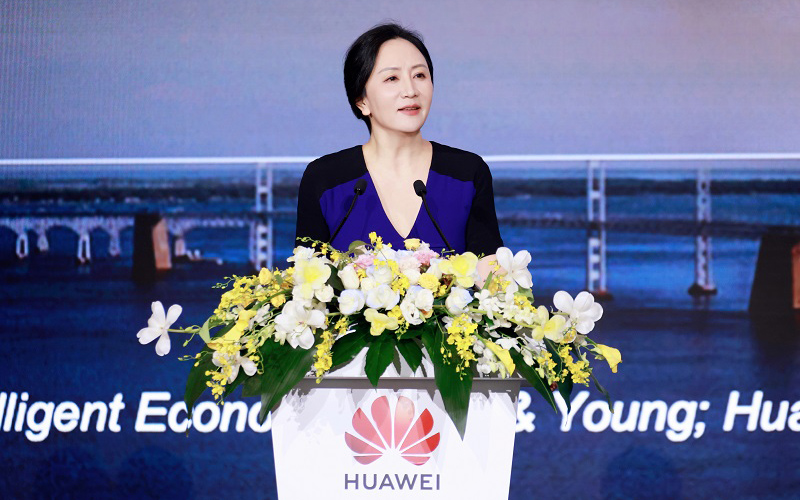
Huawei Technologies Co forecast that global artificial intelligence computing power will increase 500 times by 2030, and the company will keep investing in domains like connectivity, computing, storage and cloud to help accelerate digital transformation.
The moves came as Huawei adjusts its strategies in a business-as-usual approach amid prolonged US government restrictions, and focuses on creating new growth opportunities for the next few years.
Meng Wanzhou, rotating chairwoman and chief financial officer of Huawei, said digitalization is a blue ocean for the whole industry and the global spending on digital transformation will reach $3.41 trillion in 2026.
"Huawei will keep investing in domains like connectivity, computing, storage and cloud," Meng said at Huawei's ongoing 20th annual Global Analyst Summit in Shenzhen, Guangdong province.
Meng is now on her first on-duty period as rotating chairwoman of Huawei which began April 1 and will last until Sept 30.
"We aim to provide our customers with digital infrastructure that has the simplest possible architecture with the highest possible quality – that delivers the best possible experience at the lowest possible costs. Our goal is to help organizations go digital in four stages: digitizing operations, building digital platforms, enabling platform-based intelligence and putting intelligence to use. The time is ripe to thrive together in this new and exciting digital future."
Meng went on to share three major takeaways from Huawei's nearly 10 years of digital transformation experience. "First, strategy is essential. At its essence, digital transformation is about strategic planning and strategic choices. Any successful digital transformation has to be driven by strategy, not technology."
"Second, data is the foundation," she continued. "Data only creates value when it flows across an organization, so methodical data governance is key. Integrating data across different dimensions will create even greater value."
"Third, intelligence is the destination. Data is redefining productivity. Digitizing operations and building digital platforms helps clean, visualize and aggregate data, laying the foundation for digital transformation. Putting intelligence to use makes data on-demand, easier to understand and actionable, taking digital transformation to the next level."

Chinese tech heavyweight Alibaba Group Holding Ltd on Tuesday unveiled its artificial intelligence-powered large language model — Tongyi Qianwen — which it plans to integrate into all of its applicable businesses, joining the chatbot race to offer a potential rival to ChatGPT.
Alibaba Cloud, the cloud computing unit of Alibaba, will offer more enterprises access to Tongyi Qianwen so that they can build their own customized large language models.
"We are at a technological watershed moment driven by generative AI and cloud computing, and businesses across all sectors have started to embrace intelligent transformation to stay ahead of the game," said Zhang Yong, chairman and CEO of Alibaba Group and CEO of Alibaba Cloud Intelligence.
Zhang made the remarks at the 2023 Alibaba Cloud Summit, which was held on Tuesday in Beijing. The chairman added that Al large models will be applied in a wide range of sectors, giving a big boost to productivity and profoundly changing people's lifestyles.
Alibaba began researching large language models in 2019.It said the ChatGPT-style product will initially be deployed on DingTalk, the company's workplace messaging app, to summarize meeting notes, create poetry, write emails and draft business proposals. It will also be added to Tmall Genie, Alibaba's voice assistant.
Interest in generative AI has surged since the release of ChatGPT by US-based startup OpenAI in November. A number of leading Chinese tech firms including Baidu Inc, Tencent Holdings Ltd and NetEase have jumped on the AI chatbot bandwagon.
Alibaba's unveiling came one day after Chinese AI pioneer SenseTime launched its latest set of large AI models — SenseNova — which cover key capabilities including computer vision, natural language processing and AI-generated content. Baidu rolled out its large language model and ChatGPT-like product dubbed Ernie Bot last month.
On Tuesday, China's cyberspace regulator unveiled draft measures for managing generative AI services. Providers will be responsible for the legitimacy of data used to train generative AI products, and measures should be taken to prevent discrimination when designing algorithms and training data, the Cyberspace Administration of China said.
The regulator said China supports the innovation and application of AI algorithms and other basic technologies, and encourages the use of safe and reliable software, tools and data resources. But the content generated by generative AI should be in line with core socialist values.
Pan Helin, co-director of the Digital Economy and Financial Innovation Research Center at Zhejiang University's International Business School, said the process of training large AI models necessitates higher requirements for computing capacity, and Alibaba has accumulated some advantages in AI infrastructure, with cloud computing business being a key segment driving its revenue growth.
Lu Yanxia, research director at market consultancy IDC China, is bullish on Chinese tech companies' prospects in ChatGPT-like products, as they have gained an upper hand in dealing with Chinese text information. But the use of generative AI technology also raises concerns about ethics, copyright protections and leaks infringing on personal privacy.
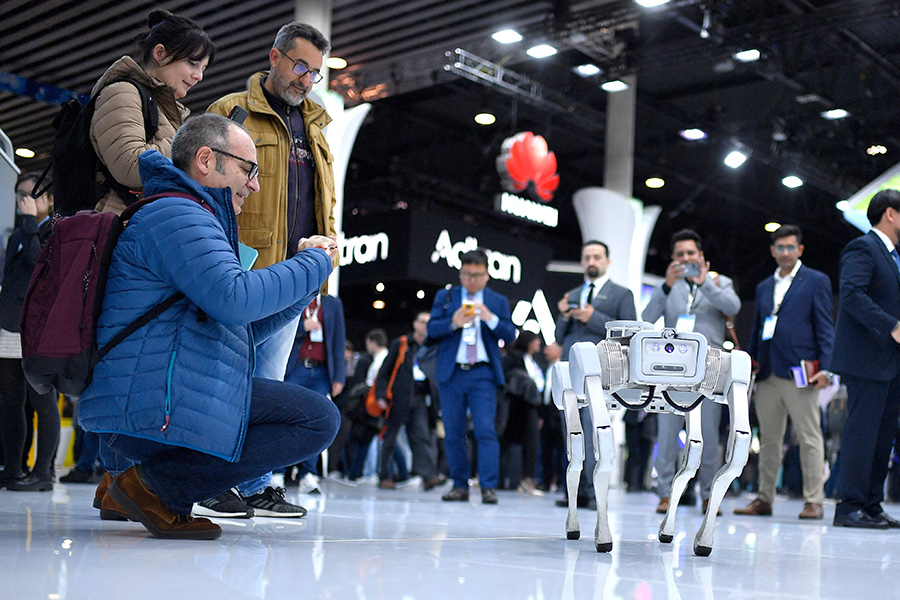
Artificial intelligence is expected to usher in speedy growth in China and become a key driving force for a new round of technological and industrial revolution, as major Chinese tech heavyweights have accelerated efforts to develop their own AI-powered large models amid a worldwide frenzy around the ChatGPT chatbot, experts said.
AI and ChatGPT-related technologies will likely free human beings from tedious tasks and enable them to focus on creative thinking, with immense application potential in fields like culture, retail, finance, healthcare and education, they added.
They called for Chinese AI companies to pool more resources into improving computing power, algorithms and quality of data, and ramp up investment in basic scientific research, including mathematics, statistics and computer science to gain a competitive edge in the AI chatbot race.
AI is gaining momentum and finding a wide range of applications across various industries, with the penetration rate expected to reach 20 percent in 2026, said Tian Qi, chief scientist in AI at Huawei Cloud.
Tian, who is a fellow of the Institute of Electrical and Electronics Engineers (IEEE) — the world's largest technical professional organization — made the remarks at a forum on AI large model technology held by the Chinese Association for Artificial Intelligence in Hangzhou, Zhejiang province, on Saturday.
He said AI is speeding up integration with traditional scientific calculations in the fields of meteorology, oceanography, agriculture, machinery, aviation, aerospace and geology, emphasizing the process of training AI models has higher requirements for capital input and computing power.
Tian said Huawei has been investing in its Pangu AI large models over the past few years, and has built AI models for industrial applications covering pharmaceuticals, electric power, meteorology, mining and finance.
He Xiaodong, vice-president of Chinese e-commerce giant JD, said at the forum that JD will launch its new-generation large model dubbed ChatJD, a ChatGPT-like product for industrial use, sometime this year.
A host of Chinese tech companies including Alibaba Group, Baidu Inc and NetEase have jumped onto the AI chatbot bandwagon, as ChatGPT has taken the world by storm.
Alibaba said on Friday that it has invited enterprise users to test a self-developed large model called Tongyi Qianwen. Last month, Baidu unveiled its large language model and Chinese-language ChatGPT alternative, Ernie Bot, which could be implemented in a variety of functions including searches, autonomous driving and smart devices.
"China has gained an upper hand in bolstering the industrial application of AI compared with its foreign counterparts, given that the country boasts relatively complete industrial categories, an ultra-large consumer market and a strong development foundation," said Pan Helin, co-director of the Digital Economy and Financial Innovation Research Center at Zhejiang University's International Business School.
Noting Chinese tech heavyweights and AI unicorns have invested heavily in building AI large models, Pan is bullish on the prospects of the AI-generated content sector and the application of ChatGPT-style conversational chatbots in China.
Global market research firm International Data Corp said China's spending on AI will likely hit $14.75 billion in 2023, accounting for about one-tenth of the global AI market. The scale of China's AI market is expected to reach $26.44 billion in 2026, with a compound annual growth rate of over 20 percent between 2021 and 2026.
China has made significant progress in developing AI technology. A Stanford University report showed that China filed more than half of the world's AI patent applications in 2021 and continued to lead the world in the number of AI journals, conference papers and related publications.
However, a new set of problems will likely emerge, including ethics, privacy leakage and data security, accompanied by the commercial use of AI large models, experts said.
The Payment & Clearing Association of China on Monday called on participants in the payment industry to use ChatGPT with caution, considering the risks of cross-border data leakage.
The risks of using ChatGPT and other tools to process work content should be comprehensively assessed, and such tools should be used in accordance with laws and regulations, the association said in a statement, underlining participants in the payment industry should not upload key and sensitive information when using ChatGPT.
Lu Yanxia, research director at IDC China, said Chinese tech companies possess the advantages of offering users AI-powered conversational results based on Chinese language, adding that generative AI has triggered a new AI wave and brought about new business opportunities for domestic AI servers, cloud computing and chip companies.

Leading Chinese tech companies said on Thursday that they would not like to see a pause or slowdown in the game-changing GPT-4 technology, but instead vowed more efforts to develop responsible artificial intelligence to balance benefits and risks.
They made the comments after Tesla CEO Elon Musk and dozens of other tech executives called on AI labs to cease training models more powerful than GPT-4 — the latest version of the large language model software developed by US startup OpenAI.
"We are not willing to see a stop or slowdown of GPT-4 related technology. To be frank, once tech advances, there is no way to stop or reverse it," said Du Lan, senior vice-president of tech firm iFlytek, at the ongoing Boao Forum for Asia on Thursday.
But Du said that it is necessary to make good use of the technology, which is always a double-edged sword.
"More efforts should be made to develop AI that is safe, controllable and benefits human beings," she said.
Zhou Hongyi, founder of 360 Security Group, said via social media on Thursday that not developing (GPT-4 and related technology) in fact poses the greatest insecurity.
"China must catch up with the trend of GPT, as it will bring about a substantial increase in productivity, thereby enhancing a country's competitiveness," he said.
Zhou added that whether people are willing or not, GPT will lead a new round of industrial revolution that goes beyond the invention of the internet or the iPhone.
"Chinese companies are still around two years behind GPT-4's level of development. Therefore, it is too early to worry about the risks. China should develop its own large AI model," he said.
As ChatGPT takes the tech world by storm, an array of Chinese tech companies including Alibaba Group Holding, iFlytek and NetEase are already on the way to developing similar models.
A group of AI experts, including Kai-Fu Lee, former head of Google China and CEO of Chinese investment firm Sinovation Ventures, along with Meituan co-founder Wang Huiwen, also launched new startups to develop competitors to ChatGPT.
Baidu Inc is one of the first Chinese companies to launch a potential ChatGPT competitor — Ernie Bot. Shen Dou, executive vice-president of Baidu, said at the Boao Forum on Thursday that Chinese companies should act as soon as possible instead of thinking too much.
"But more efforts are needed to rethink a company's own advantages and how to use AI to amplify this advantage," Shen said.
Shen emphasized that generative AI will create new occupations and he predicted that more than 50 percent of people will be "instructors" in the future to guide AI to perform tasks.
The latest data from International Data Corp predicts that China's AI spending will increase to $14.75 billion this year, accounting for about one-tenth of the global AI market.
Justin Yifu Lin, dean of the Institute of New Structural Economics at Peking University, said at the forum: "Instead of worrying about it, people should actively embrace technological change. Technological advancement may lead to fewer jobs but also give people more opportunities to enjoy life."

China's Ministry of Science and Technology has launched a special deployment of "AI for Science", Xinhua reported on Monday.
The deployment closely integrates the key issues of basic disciplines including mathematics, physics, chemistry and astronomy.
It focuses on the scientific research needs in key areas such as drug research and development, gene research, biological breeding, and new material research and development.
"AI for Science" is the product of deep integration of "artificial intelligence technology represented by machine learning" and "scientific research".
The Ministry of Science and Technology will promote the innovation of AI models and algorithms for major scientific problems, and develop a number of dedicated platforms for "AI for Science" for typical scientific research fields.
The ministry will also accelerate the construction of a national open innovation platform for a new generation of AI public computing power, and support the heterogeneous and integrated development of high-performance computing centers and intelligent computing centers.
It will also encourage green energy and low-carbon energy, promote the upgrading of software and hardware computing technologies, and encourage various scientific research entities to open scientific data according to the principle of classification and grading.
In terms of personnel and mechanisms, the ministry supports more scientists and researchers in the fields of mathematics and physics to devote themselves to relevant research, cultivate and gather interdisciplinary R&D teams and promote the establishment of an "AI for Science" innovation consortium.
An international academic exchange platform will also be built to jointly promote the solution of cancer diagnosis and treatment, climate crisis and other common scientific challenges of mankind.
Attention will also be paid to scientific research ethics in the development process of "AI for Science" to promote its healthy and sustainable development.
The Ministry of Science and Technology will give full play to the coordinating role of the new generation of AI Planning and Promotion Office, integrating resources such as projects, platforms and talents, and forming policy synergy for promotion.
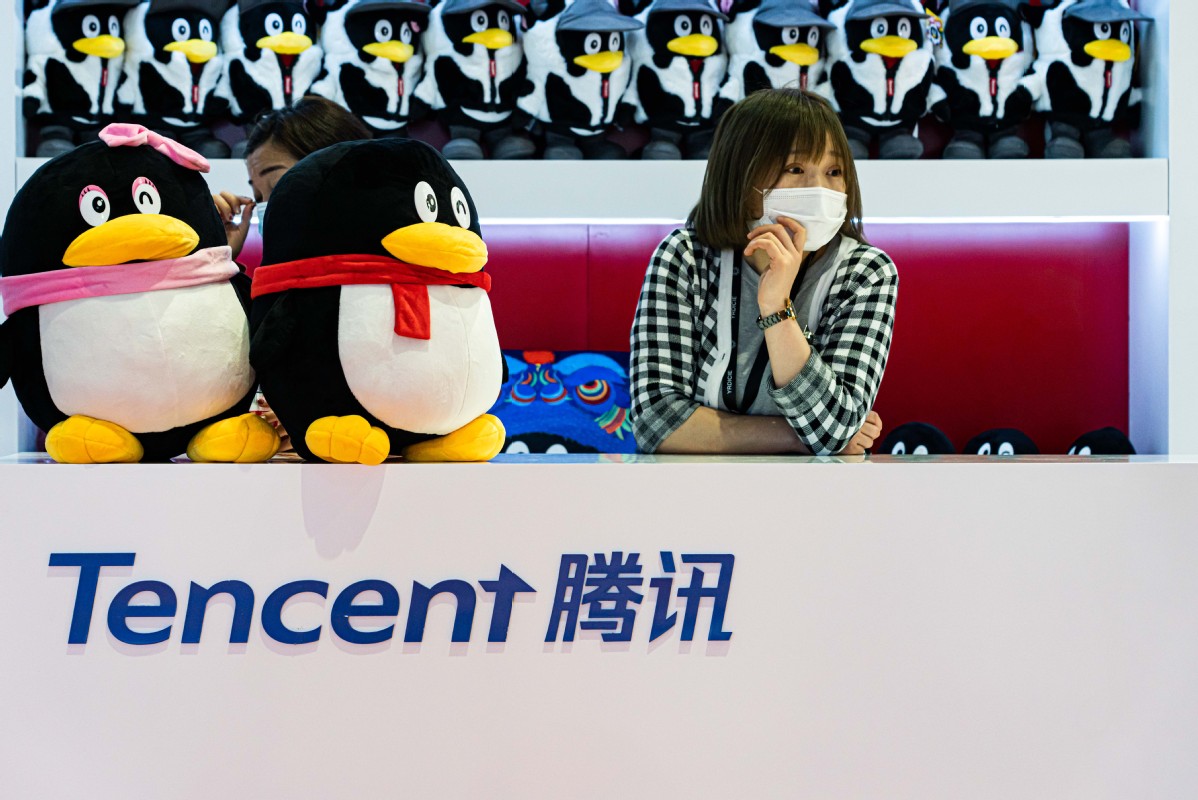
Chinese tech leader Tencent Holdings said on Wednesday that artificial intelligence would be a future "growth multiplier" for the company, as it reported a rebound in net profit in the fourth quarter of last year.
The company's net profit, after five successive quarters of declines, rose 19 percent year-on-year to 29.7 billion yuan ($4.32 billion) in the fourth quarter.
Though the overall revenue last year saw slight drop to 554.55 billion yuan, revenue from businesses related to the integration of digital economy and real economy, represented by fintech and enterprise services, hit a new high of 177.06 billion yuan.
Amid the worldwide ChatGPT craze, Tencent President Martin Lau said during a medica call that the company would invest resources into building foundational AI models and gradually roll out its own, but that the company would not rush to launch a similar chatbot.
Notably, Tencent's gaming growth remained solid. Revenue from gaming businesses overseas in particular soared 5 percent to 13.9 billion yuan.
Also, WeChat Channels, Tencent's short video platform, saw the number of daily active creators and video uploads rise by over 100 percent year-on-year last year.
The total time users spend on Channels also exceeded that of WeChat Moments, a popular social networking function allowing interaction with text, photos and videos between WeChat friends.
